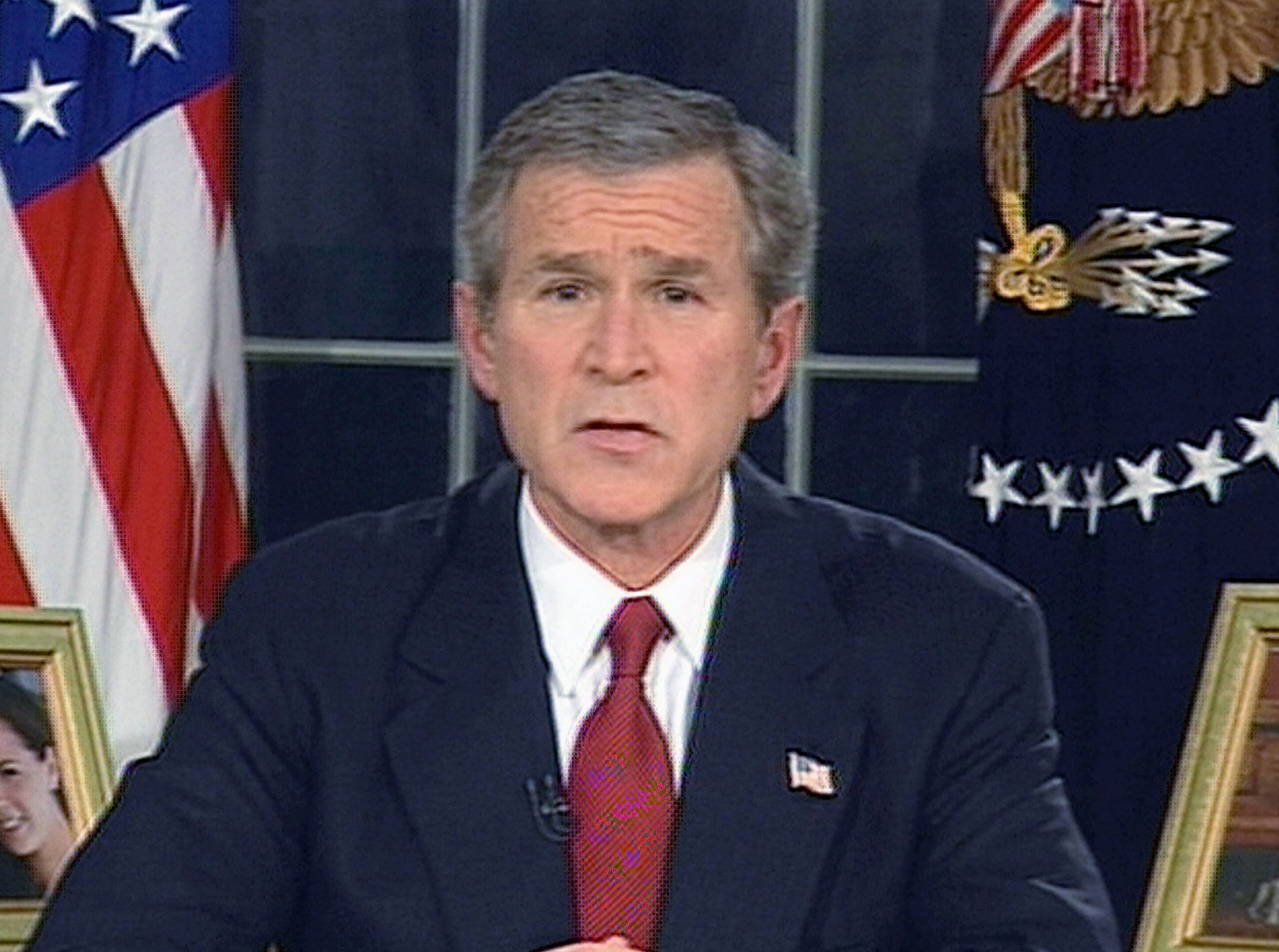
Bush’s Blunder
President George W. Bush told the nation and the world about the commencement of Operation Iraqi Freedom at 10:16 p.m. ET on March 19, 2003. As he spoke, American forces were already on the attack eight time zones away.
Bush said that the invasion was about “helping Iraqis achieve a united, stable, and free country.” And, he added, the mission “will require our sustained commitment.”
The Iraqis, of course, had not asked for that “help,” and a “sustained commitment” to a country 6,000 miles away was not what Americans wanted, but it was exactly what Bush and his neoconservative advisers wanted. Some had dreams of re-colonizing the Middle East; others had dreams of securing its oil.
For his part, Bush dreamed even further; he later said his real goal was “ending tyranny in our world,” with the war in Iraq as just a stepping stone. Nobody ever said that the neocons were realistic.
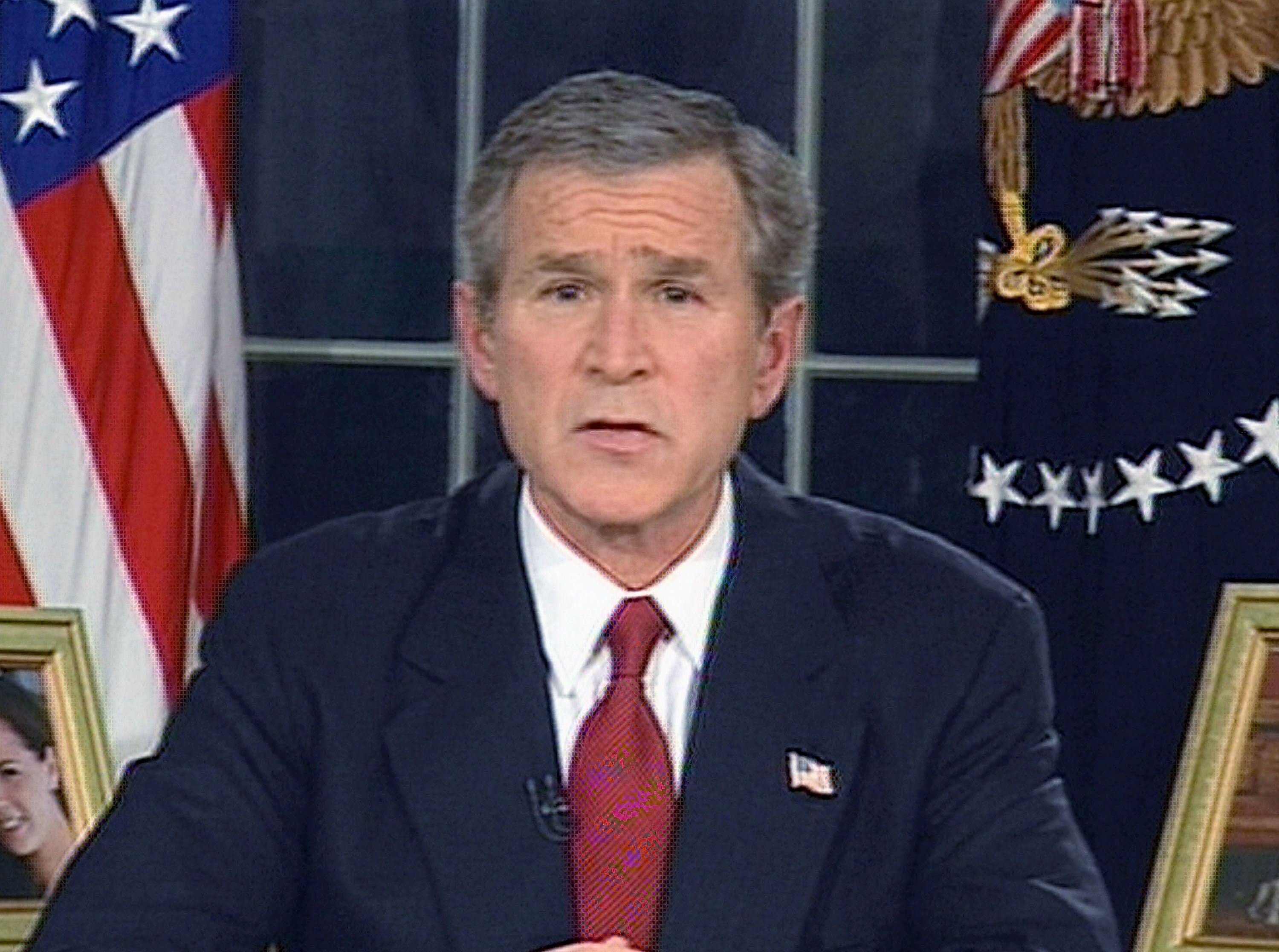
President George W. Bush announces the start of the U.S. military invasion of Iraq in a televised address from the Oval Office on March 19, 2003. (Getty Images)
It had been clear that Bush wanted a war on Iraq since his January 29, 2002, “Axis of Evil” speech. This author wrote immediately that such a war would be a bad idea. Anticipating “regime change” (a nice way of saying “conquer someone else’s country”), I wrote that we would be going into a place that we didn’t know, egged on by false friends, such as the notorious double-dealer Ahmed Chalabi, who was as popular in Washington, DC, think-tanks as he was unpopular on the streets of Baghdad. I wrote at the time:
Is this what we can expect in Iraq — our chosen friends displaced by our unchosen enemies? There’s no way to know. But as the American experience in Afghanistan suggests, we don’t know much of anything about Muslim politics. Indeed, about the only thing we can know for sure about Iraq is this: American gains will be secure for only as long as Americans remain.
So, of course, the war proved to be a fiasco. As one history-minded observer wrote last week: “This month marks the 20th anniversary of the greatest western foreign policy disaster since the Fourth Crusade. It was the pre-eminent modern-day example of folly, driven by wishful thinking, utopianism and a lack of interest in history and how human societies differ.”
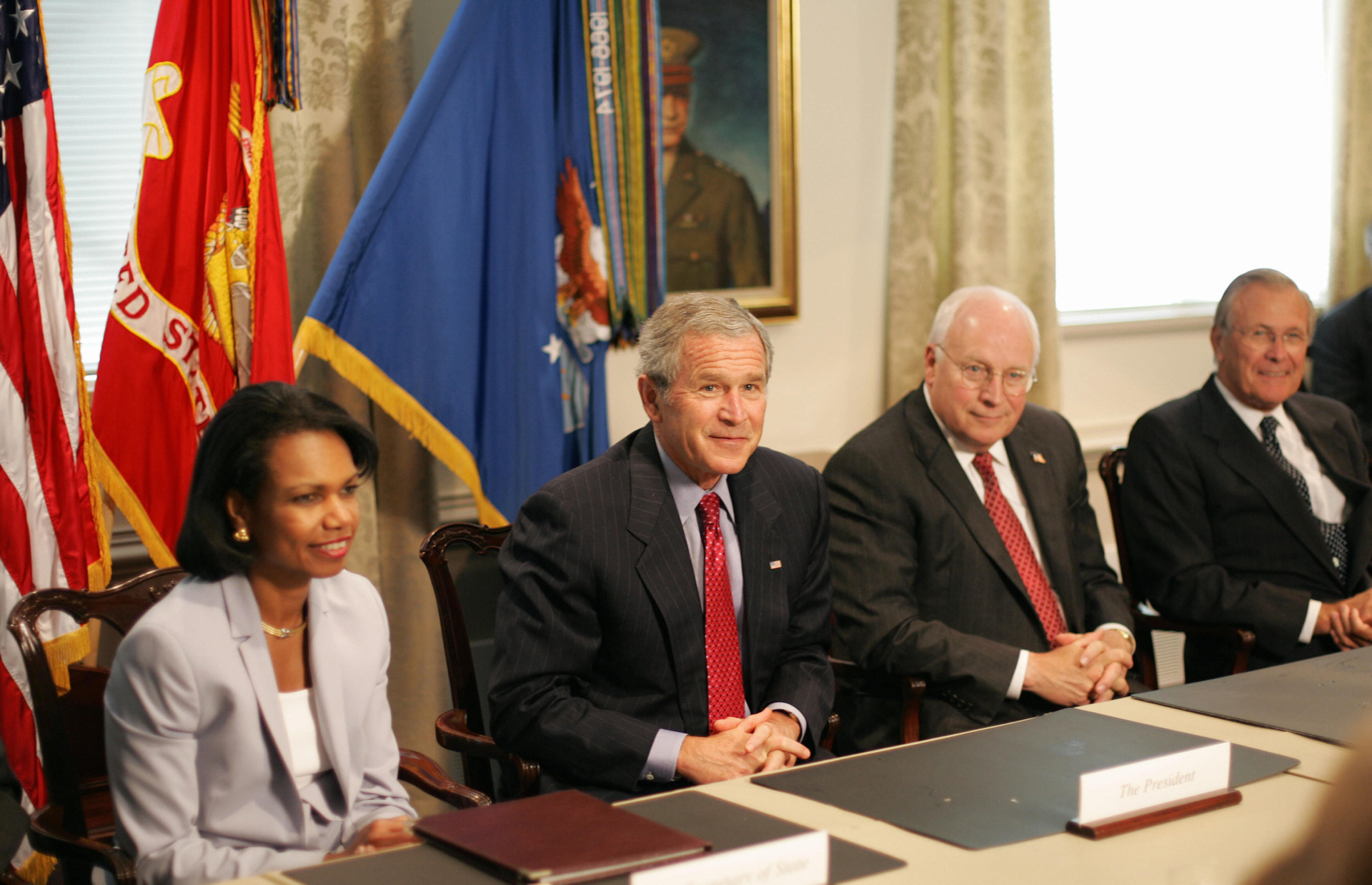
From left to right: Secretary of State Condoleezza Rice, President George W. Bush, Vice President Dick Cheney, and Secretary of Defense Donald Rumsfeld during a meeting on August 14, 2006, at the Pentagon. (TIM SLOAN/AFP via Getty Images)
To be sure, historians will be evaluating Iraq and all its global implications for a long time to come. But it’s already clear that the war pushed Iran, Russia, and China into a tighter alliance, which they considered to be self defense. So, how should the U.S. deal with a hostile Eurasian bloc in the heart of the “world island”? That’s a riddle that will preoccupy foreign policymakers for the next hundred years or more.
But for now, we might just consider some of the domestic effects of Bush’s war.
We can start with the outright costs of the war. Then we can observe various political costs — specifically, how the war broke the Bush political dynasty. More broadly, the war broke our faith in government experts. It also clarified the reality of the so-called “Uniparty,” which helped in the rise of Donald Trump in 2016. And finally, the war validated the thinking behind America First.
Let’s look at each of these effects in turn.
Cost of the War
Brown University’s Watson Institute estimates that between 276,000 to 308,000 people died in the second Iraq War, including 4,572 American troops, 3,588 U.S. contractors, and as many as 207,156 Iraqi civilians. Wounds and injuries — immediate and slow-acting — account for tens of thousands more. The full scope of the human tragedy, particularly for the people of Iraq and the region, can never fully be grasped.
A visit to Section 60 at Arlington National Cemetery, resting place of many heroes from the Iraq and Afghanistan wars, is sobering, especially as one notices that the interment services keep coming.
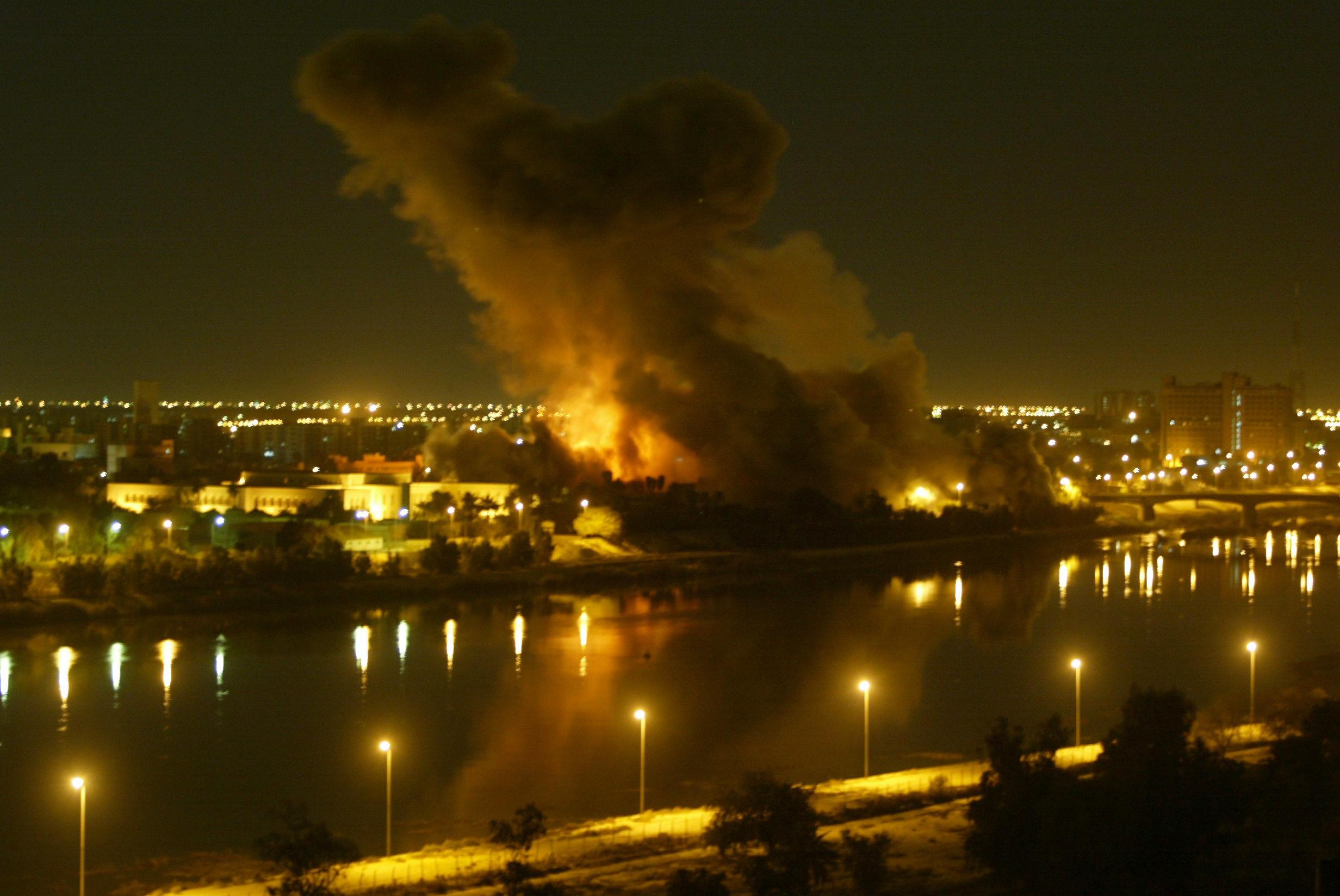
Smoke billows as a U.S. missile hits the planning ministry in Baghdad March 20, 2003. (RAMZI HAIDAR/Getty Images)
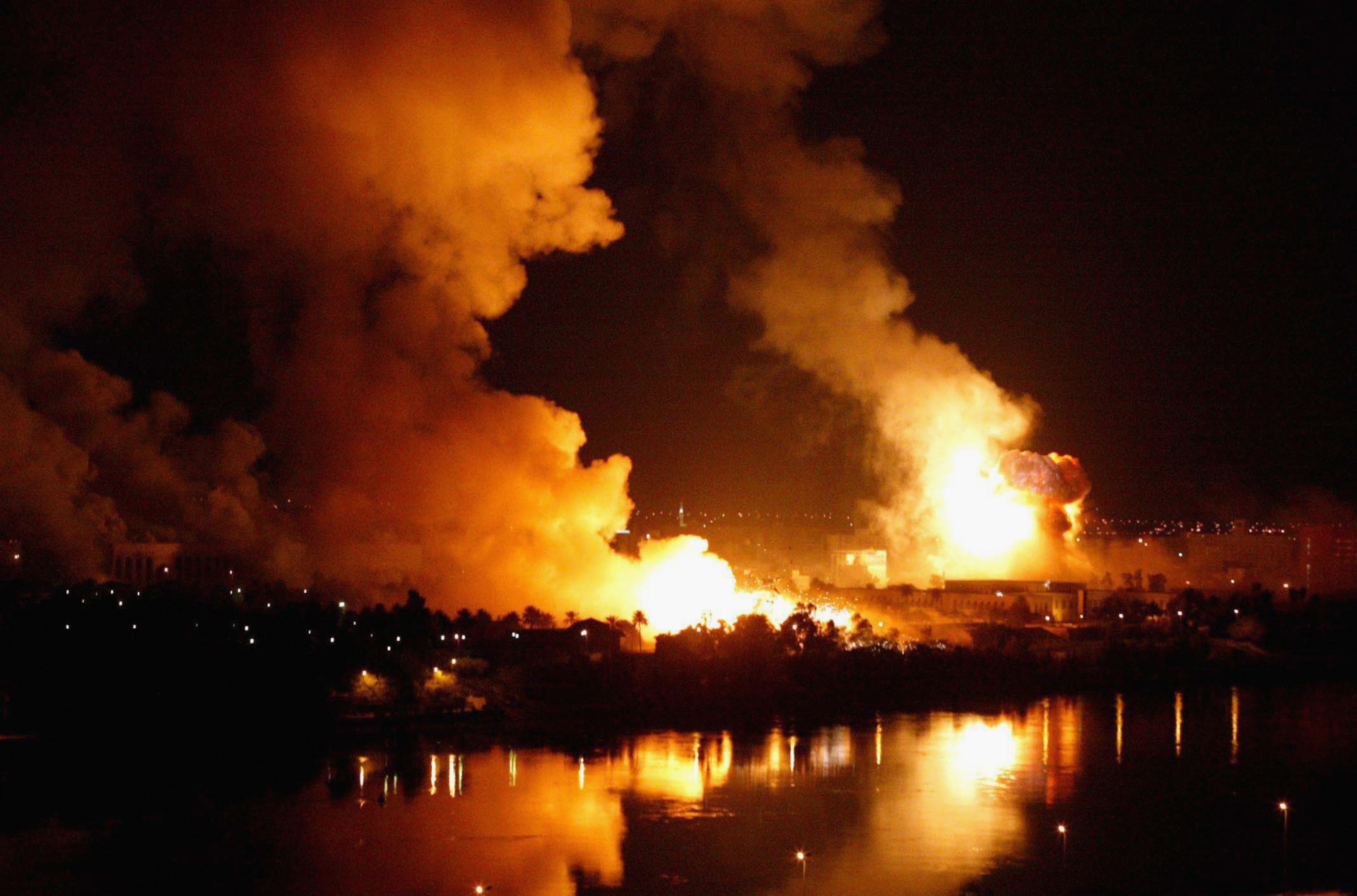
Fires burn on the west bank of the Tigris River during the first wave of attacks in the “shock and awe” phase of the second U.S. Iraq War on March 21, 2003, in Baghdad, Iraq. (Mirrorpix/Getty Images)
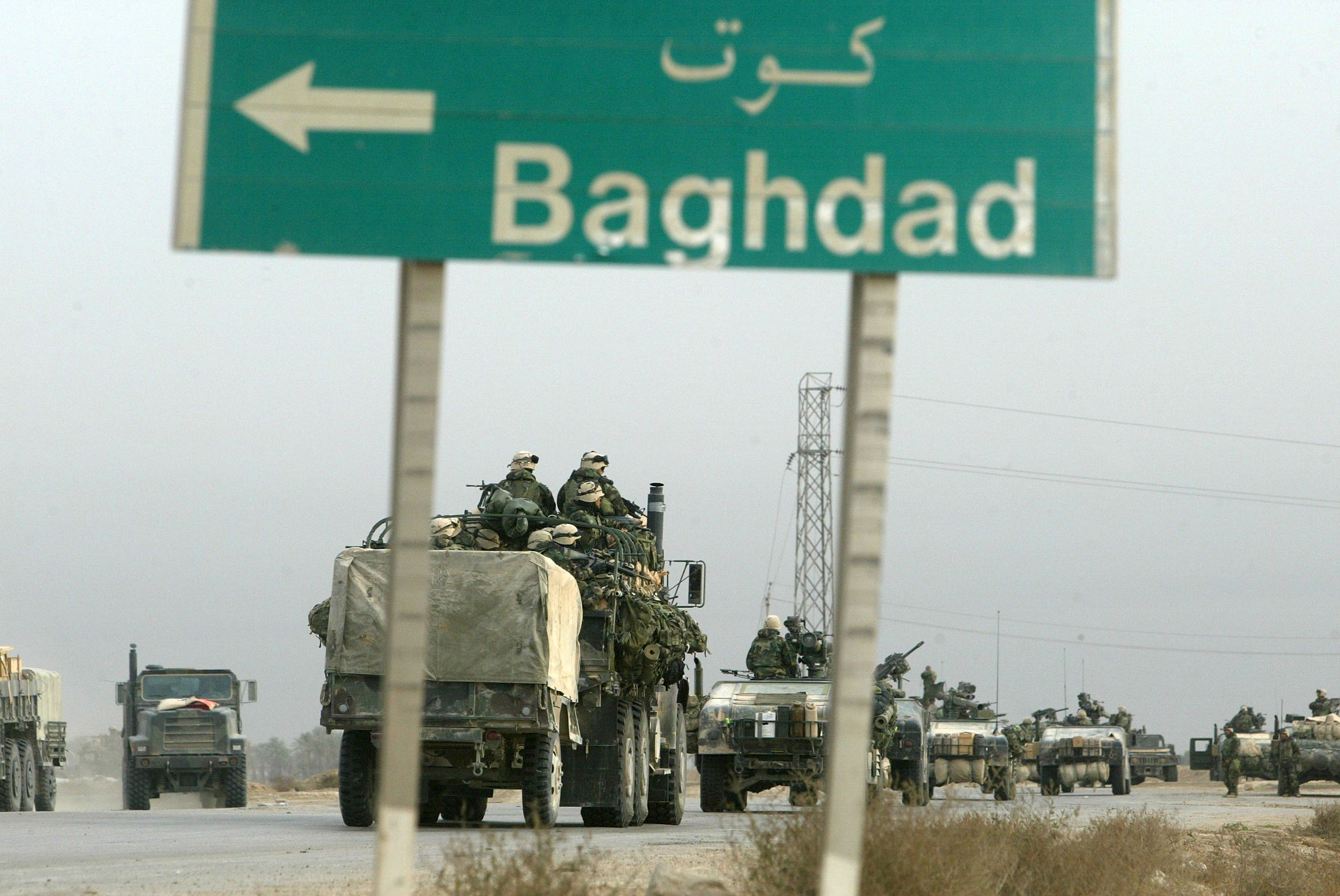
U.S. Marines pass a sign pointing the way to Baghdad as they continue their march to the Iraqi capital on March 25, 2003, in the southern Iraqi city of Nasiriyah. (Joe Raedle/Getty Images)
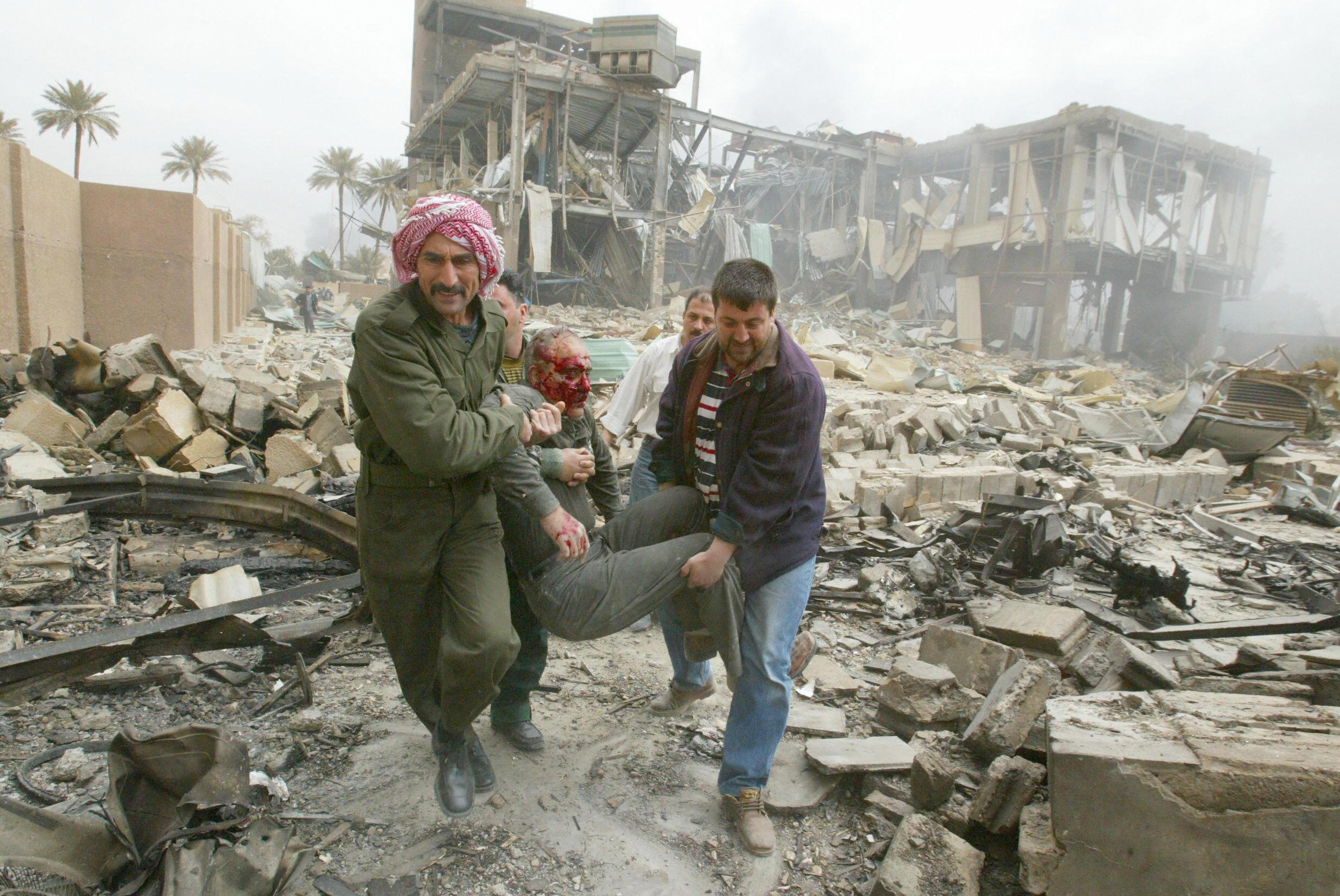
Majed Najaf (right) carries wounded Hafez Abu Haidar, an employee at the al-Salhiya telecomunications center, after it was hit by a U.S. missile during an air raid on Baghdad on March 30, 2003. (PATRICK BAZ/Getty Images)
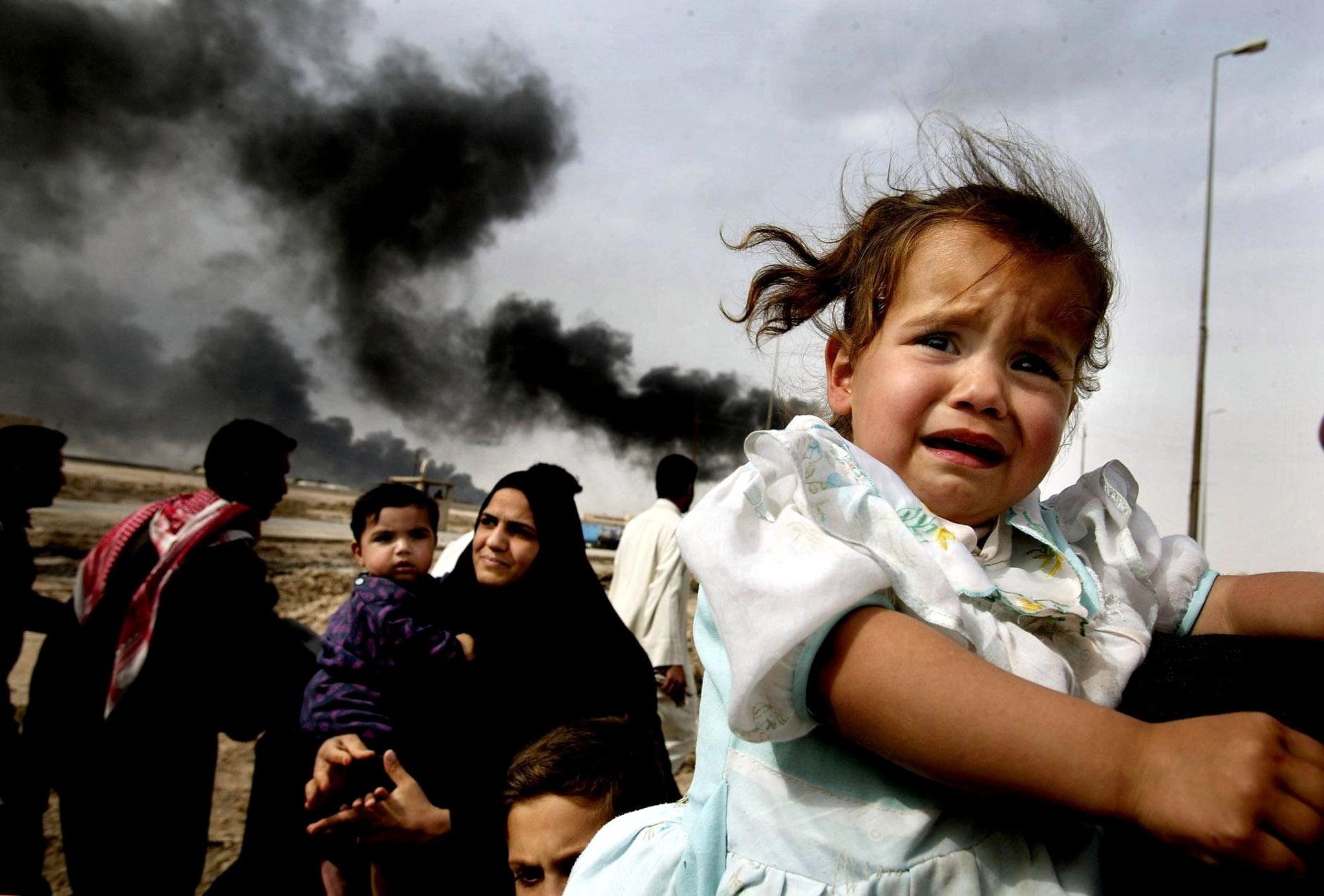
Iraqi families are forced to flee their homes in Basra in southern Iraq on March 30, 2003. (DAN CHUNG/Getty Images)
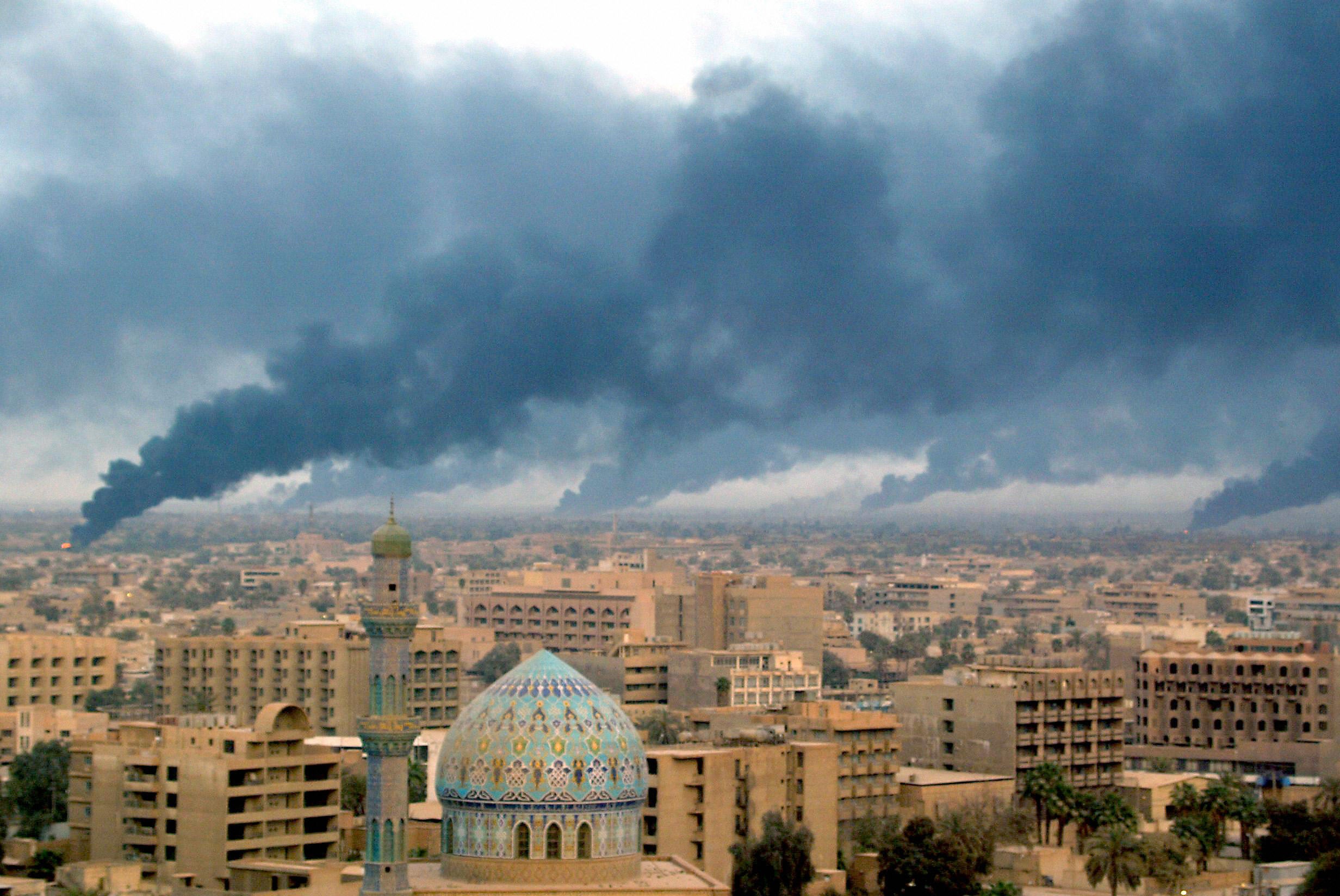
Smoke billows from burning oil trenches in Baghdad on April 2, 2003. (PATRICK BAZ/Getty Images)
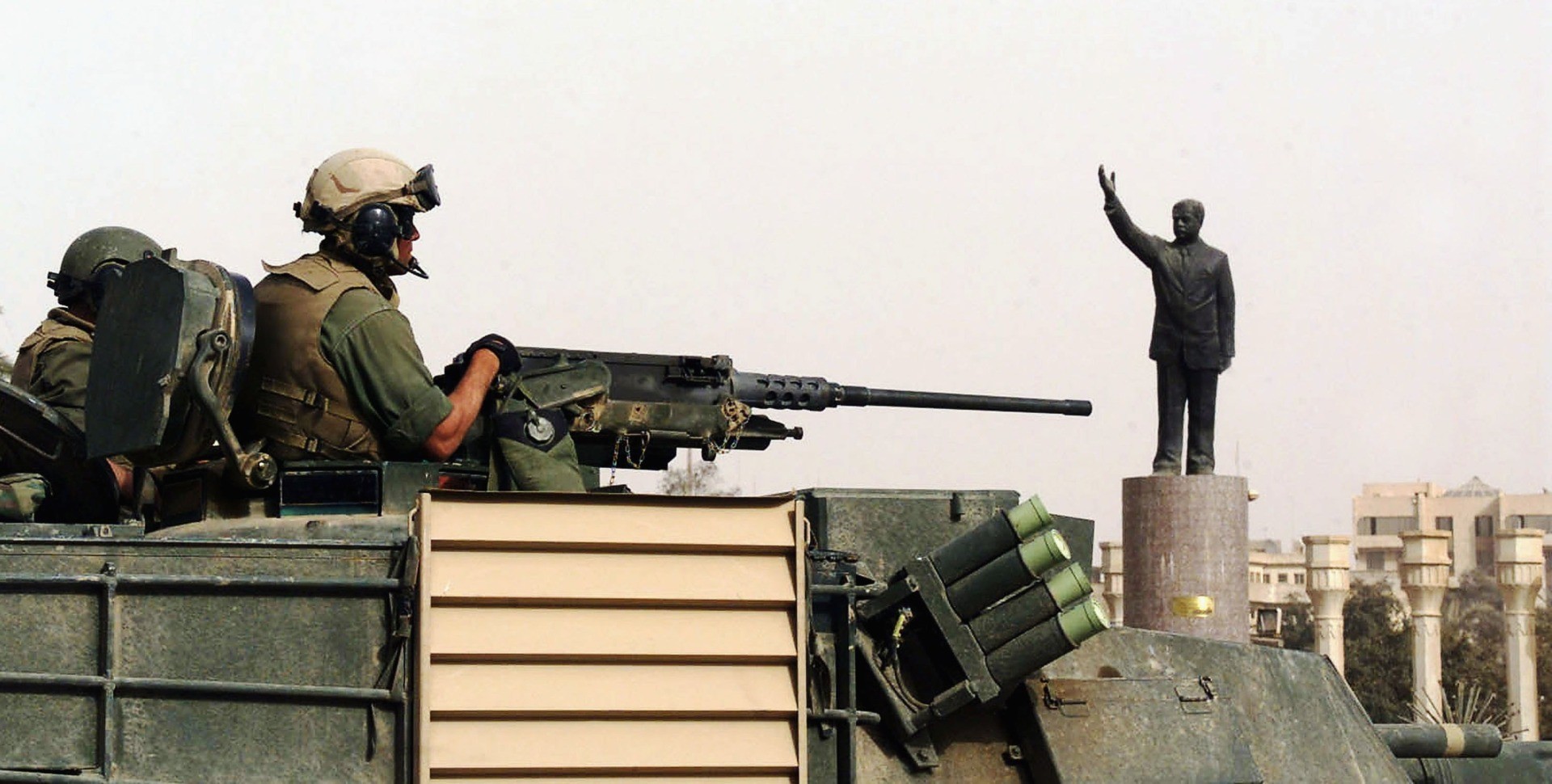
U.S. Marines are seen near the statue of Iraqi dictator Saddam Hussein at al-Fardous square in Baghdad, after the U.S. coalition forces captured the city on April 9, 2003. (Wathiq Khuzaie /Getty Images)
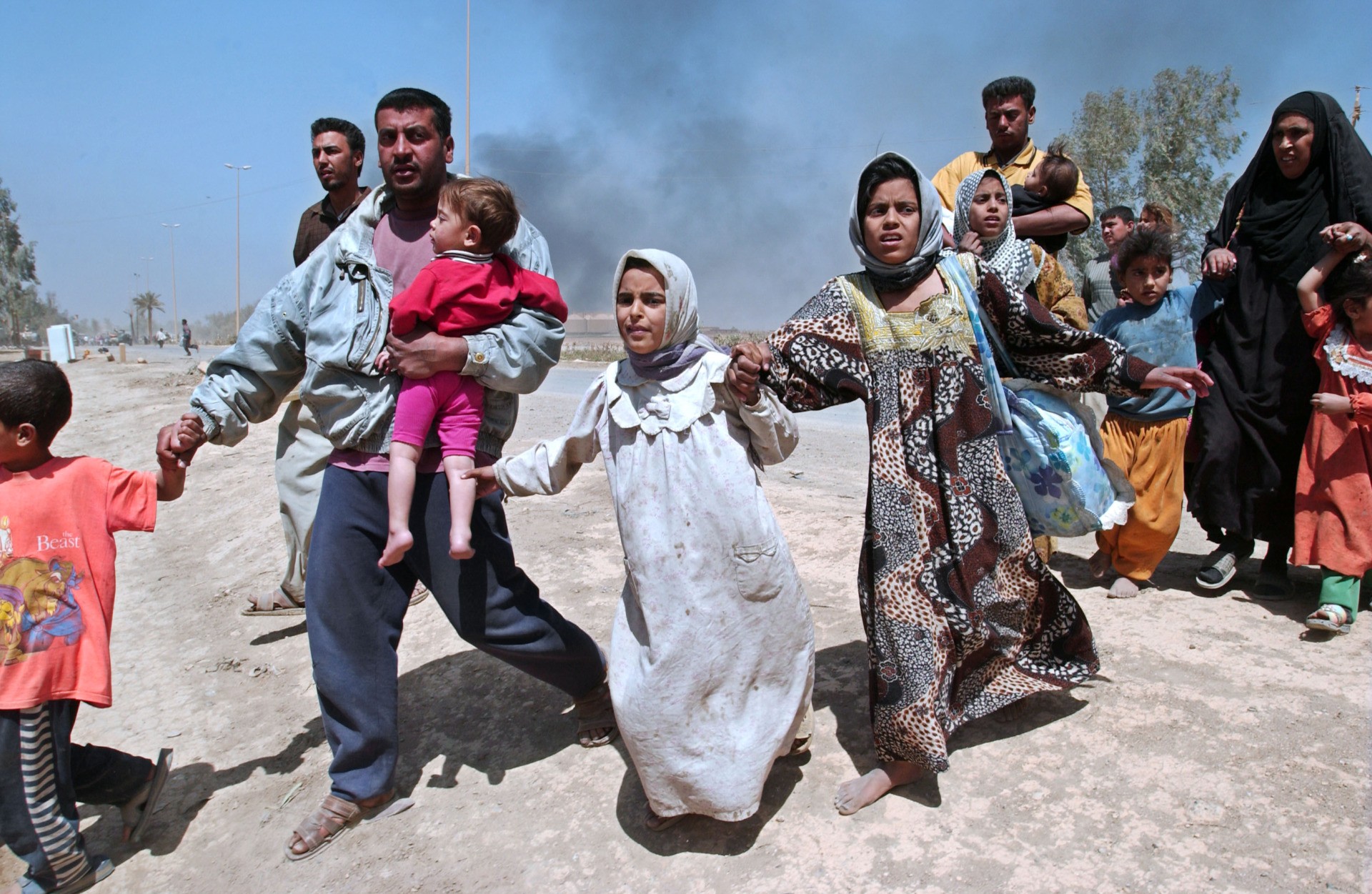
Iraqis flee Baghdad on April 11, 2003, as the Iraqi capital descended into chaos with widespread looting and lawlessness, two days after U.S. troops captured the city. (ERIC FEFERBERG/Getty Images)
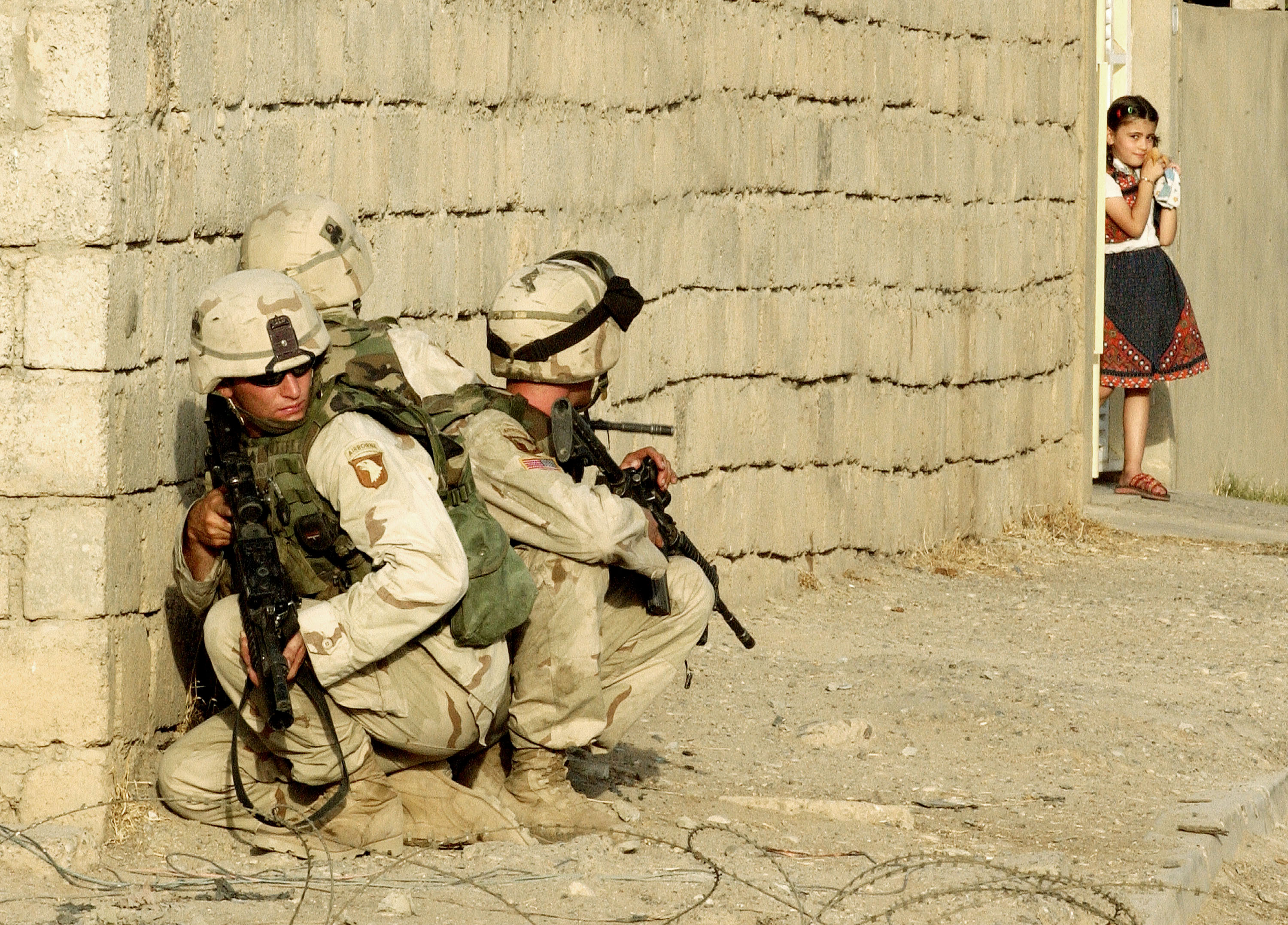
A local Iraqi girl watches from the doorway of her home as U.S. Army 101st Airborne troops take cover on July 23, 2003, in Mosul, Iraq. (Scott Nelson/Getty Images)
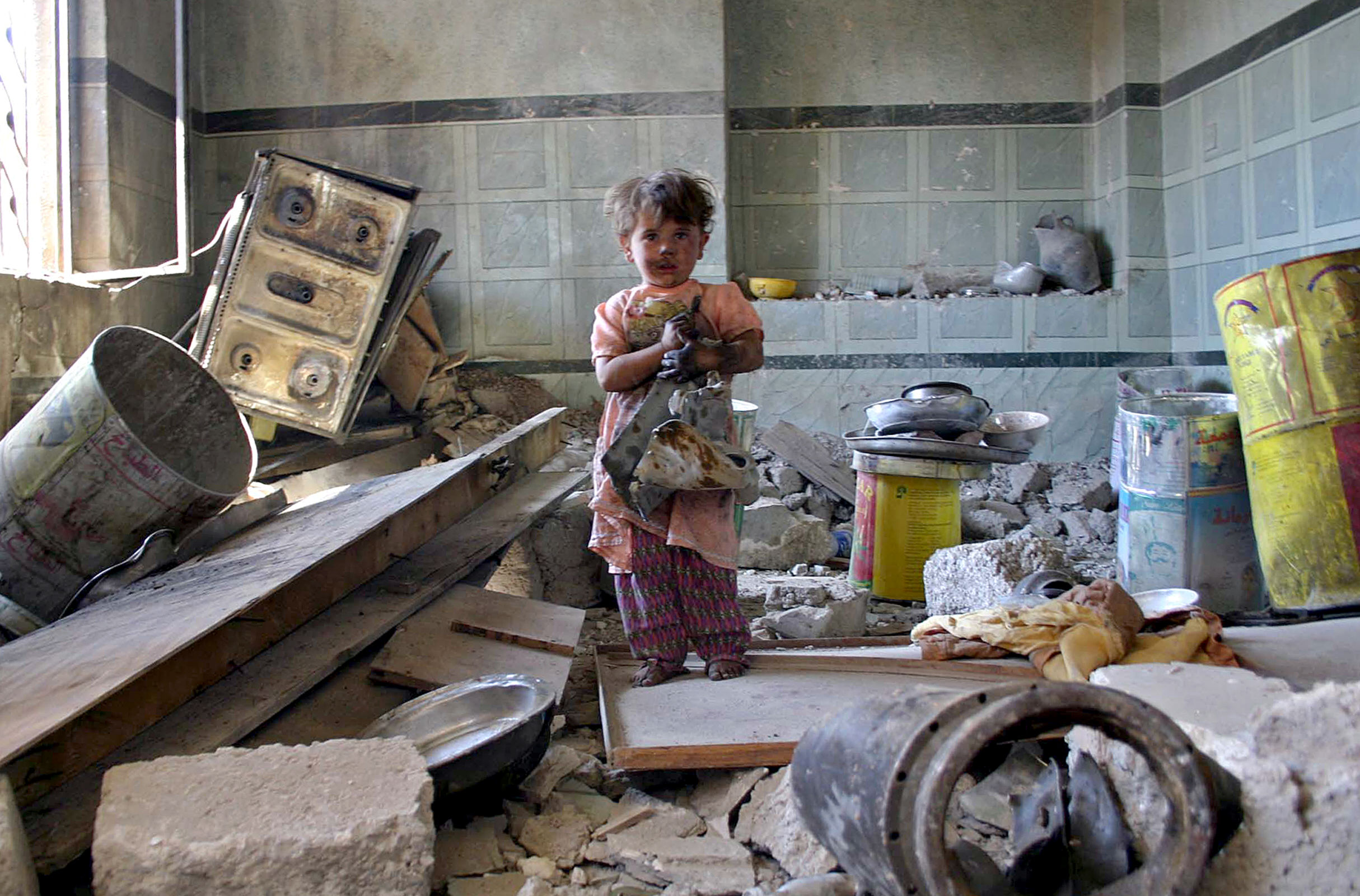
An Iraqi child stands among the wreckage of her destroyed house in the battered northern town of Tall Afar on September 15, 2004, after a battle between U.S. forces and insurgents. (MUJAHED MOHAMMED/AFP via Getty Images)
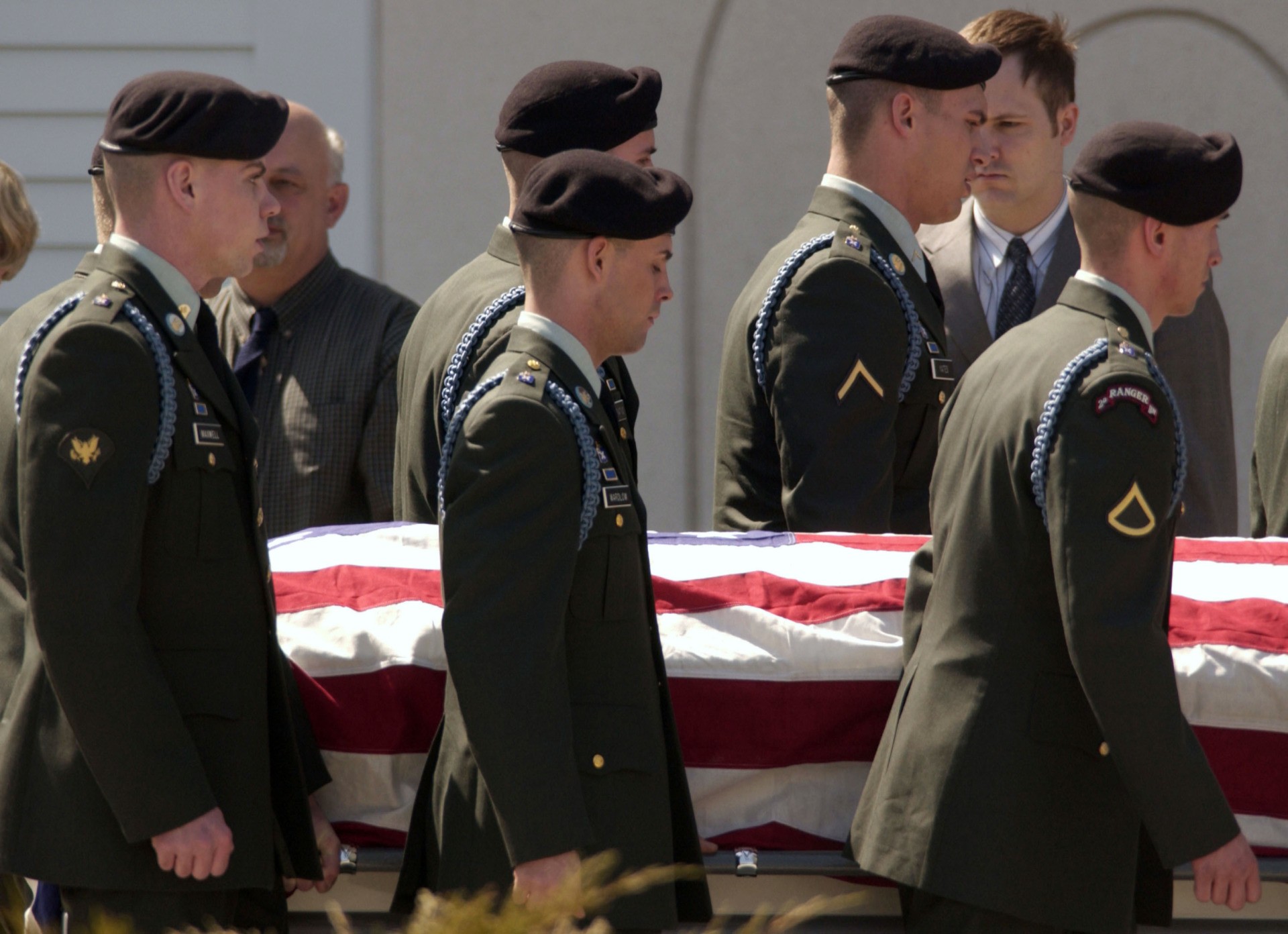
Members of the Fort Drum Honor Guard carry the casket of U.S. Army Spc. Mathew Boule, 22, during his funeral on April 15, 2003, in Dracut, Massachusetts. Boule was killed when his Black Hawk helicopter crashed during a firefight south of Baghdad. (Jacob Silberberg/Getty Images)
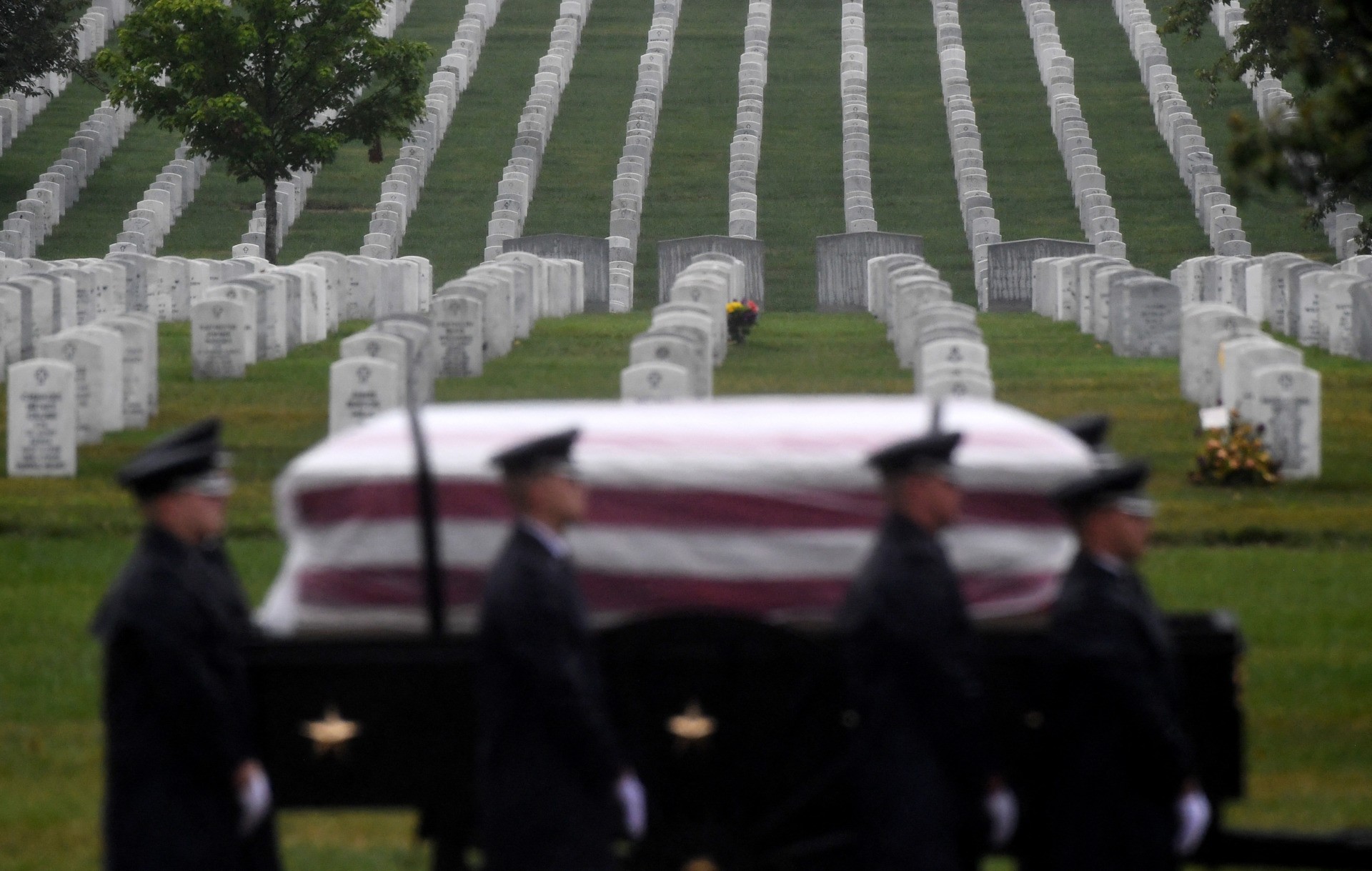
Members of the Old Guard stand next to the casket of a U.S. soldier during a full military honors burial ceremony next to Section 60, the section of Arlington National Cemetery reserved for those killed during the wars in Iraq and Afghanistan. (OLIVIER DOULIERY/AFP via Getty Images)

Mary McHugh mourns her slain fiance Sgt. James Regan at Section 60 of Arlington National Cemetery on May 27, 2007. Regan, a U.S. Army Ranger, was killed by an IED explosion in Iraq in February 2007. (John Moore/Getty Images)
In 2008, Harvard University’s Belfer Center estimated the dollar cost of the war, in direct and indirect costs, at $3 trillion. And in 2020, Newsweek calculated that the Iraq War generated almost a tenth of the total U.S. national debt.
Those costs have continued to accumulate since then; and furthermore, it’s impossible to calculate the opportunity cost of the Iraq War. What would we have been doing differently if we hadn’t been spending blood and treasure in Iraq?
For instance, on the day that Hurricane Katrina hit New Orleans in August 2005, Bush was making a speech in California. The main subject? Why Iraq, of course. As The San Diego Union-Tribune reported, Bush’s speech was “the final leg of a three-city tour to boost support for the war in Iraq.” I can remember Dick Morris saying, at the time, that Bush thought he was the mayor of Baghdad. That’s where his focus was, not on New Orleans or Louisiana.
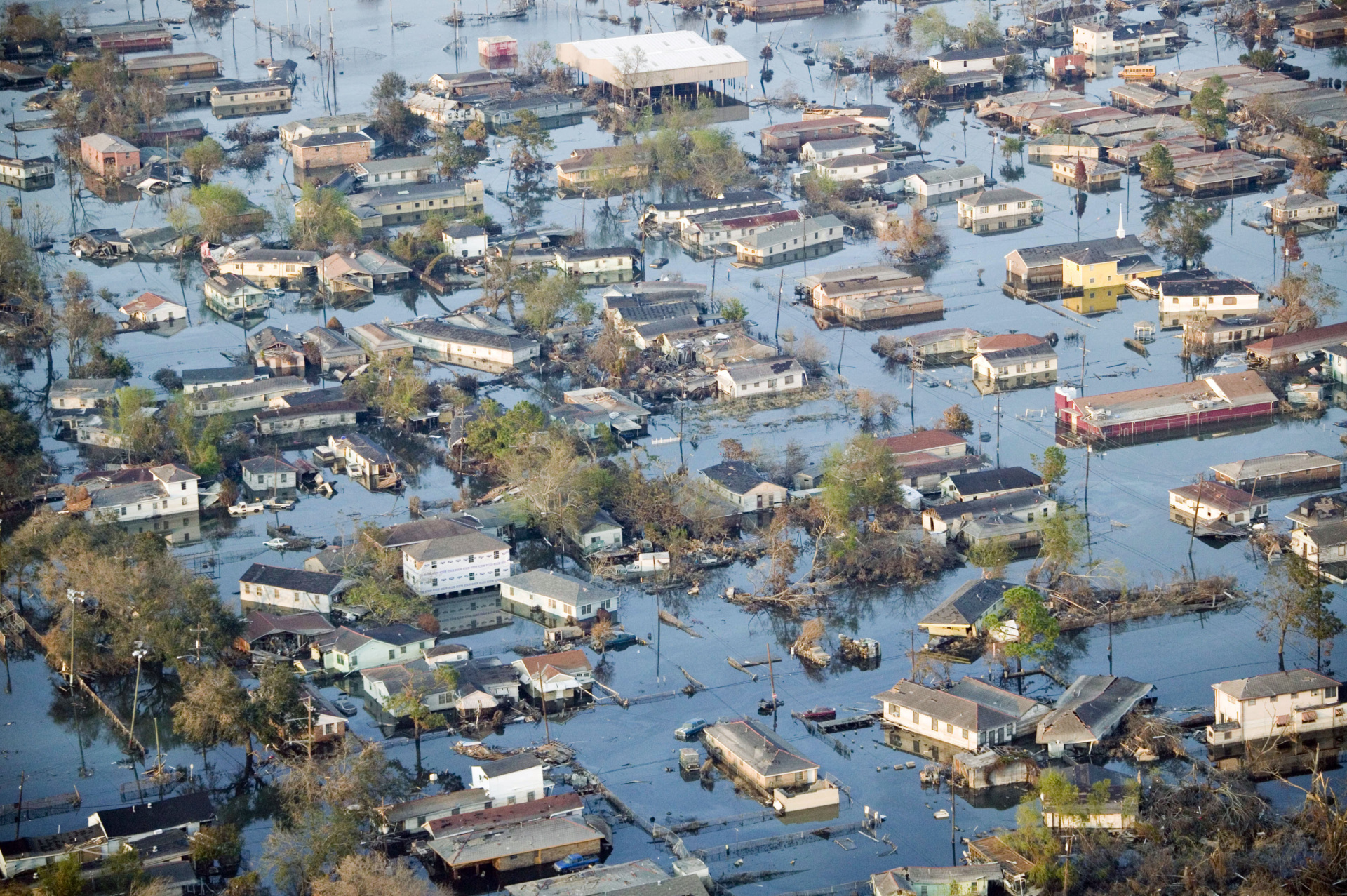
The neighborhood of Chalmette sits underwater 0n September 11, 2005 in St Bernard Parish, New Orleans, Louisiana, after Hurricane Katrina. (Jerry Grayson/Getty Images)
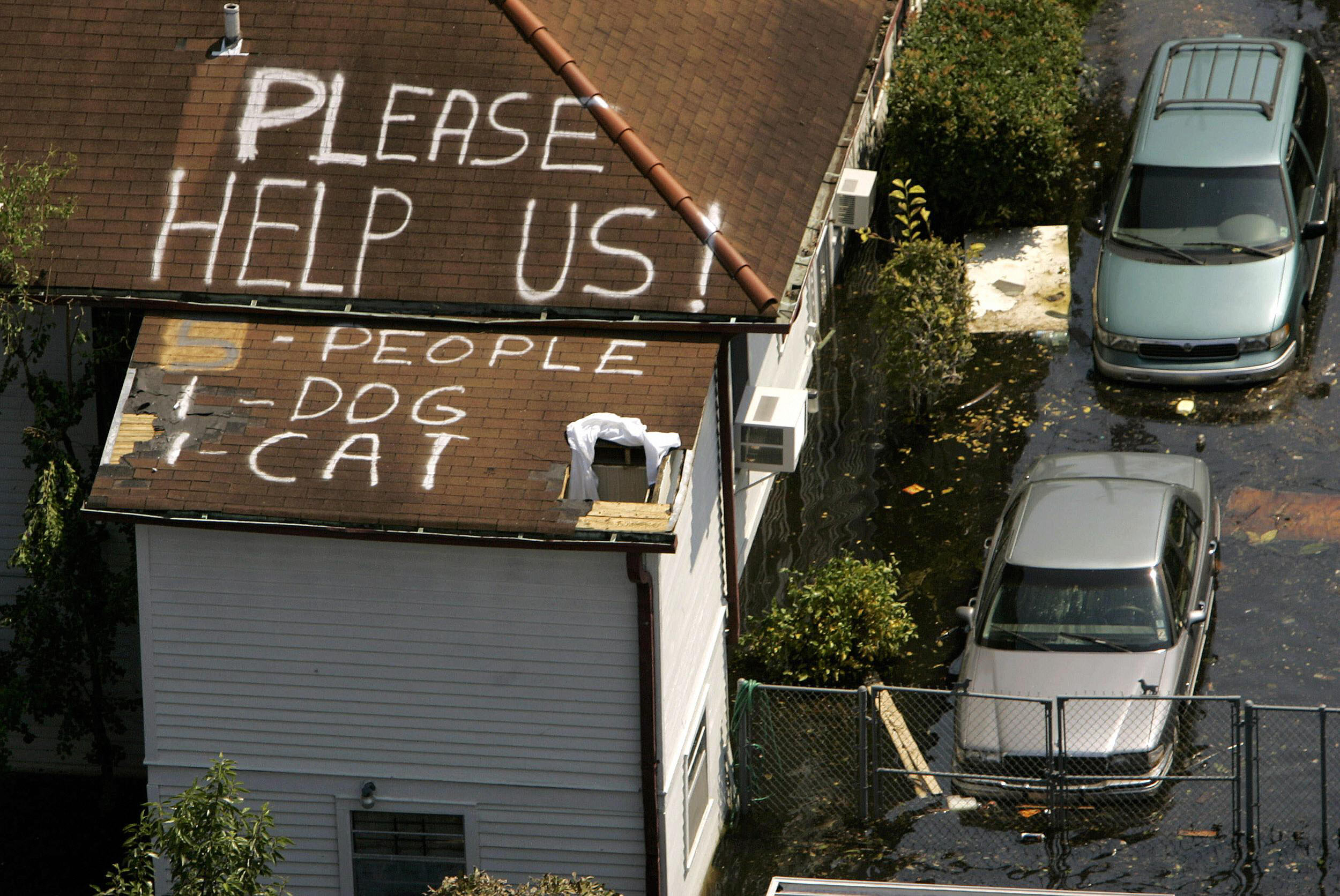
A plea for help appears on the roof of a home flooded in the aftermath of Hurricane Katrina in New Orleans, Louisiana, on September 4, 2005. (ROBERT GALBRAITH/AFP via Getty Images)
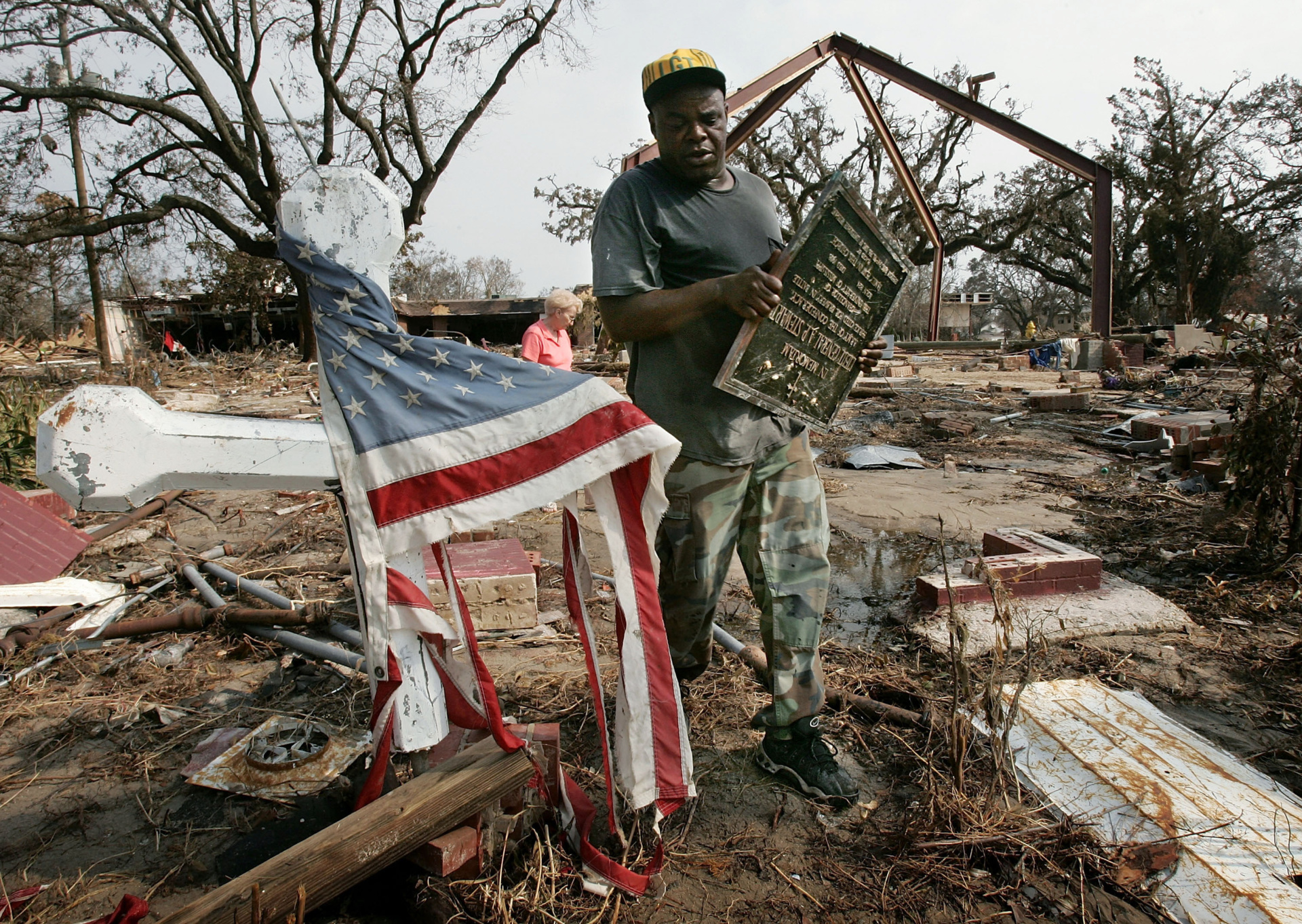
Thomas Walker, the sexton of the Episcopal Church of the Redeemer, carries a bronze plaque from the church which was destroyed by Hurricane Katrina on September 1, 2005 in Biloxi, Mississippi. (Win McNamee/Getty Images)
We might further wonder: If Bush had been thinking more about the United States, would the 2007-2008 financial meltdown have happened? Would it have been as bad as it was? We’ll never know.
But we can reasonably surmise that Bush will be remembered as a foreign-war president at a time when the homefront was crumbling, and it crumbled further during his presidency.
The End of the Bush Dynasty
From 1980 to 2012, spanning nine presidential elections in all, a Bush (George H.W. Bush or his son George W. Bush) was on the national ticket in six of those contests. To put that another way, in 36 years from 1981-2017, a Bush sat in the White House (either as president or vice president) for 20 of those years.
Now that’s dynastic dominion.
So, it only made sense, many thought, that going into the 2016 presidential election, the dynasty would be re-upped again in the person of former Florida Gov. Jeb Bush. Sample headline from Reuters on August 26, 2015: “Republican Bush still the favorite in political prediction markets.” No wonder he was able to raise $155.8 million for his campaign.
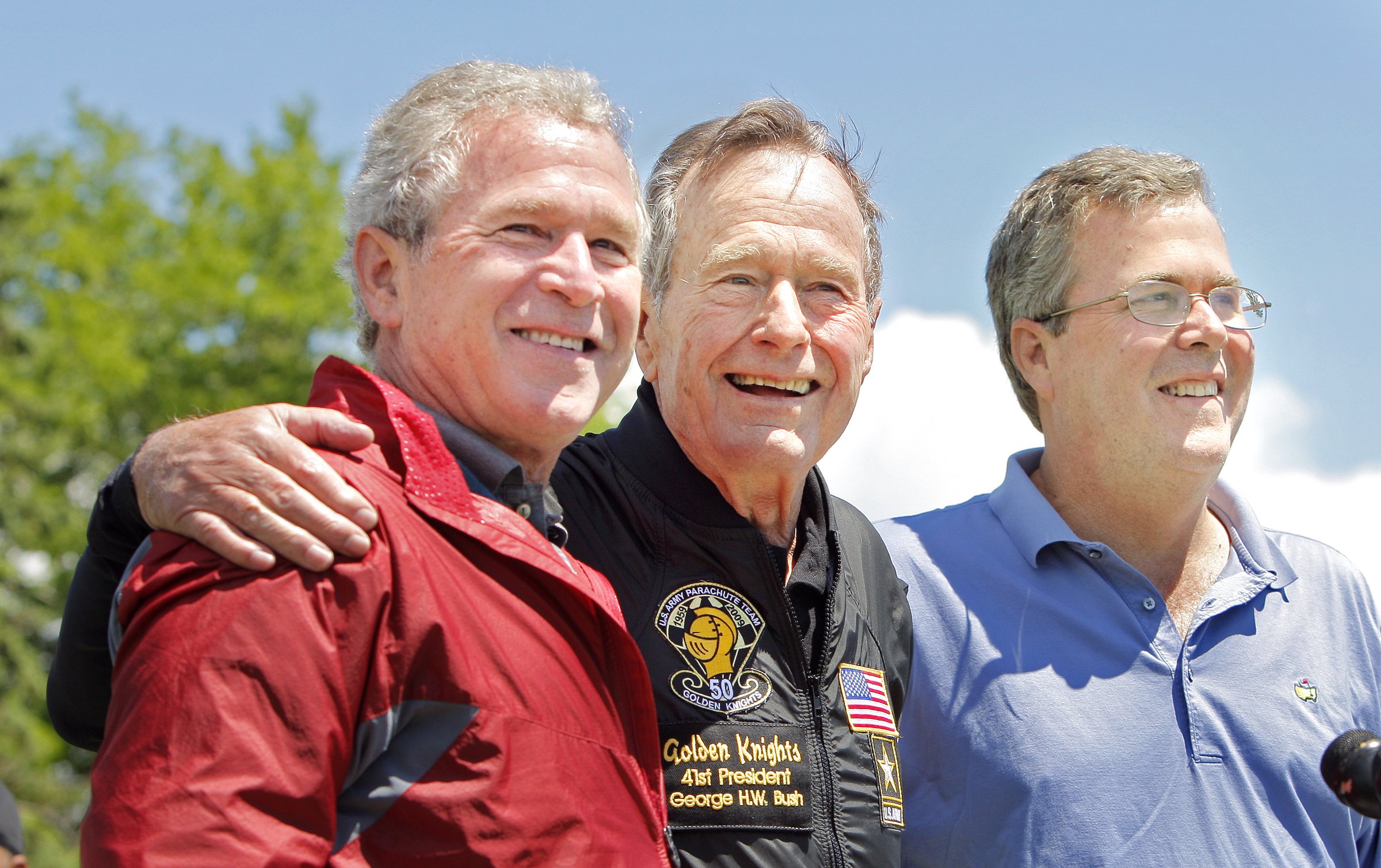
Former President George H. W. Bush poses with his sons former President George W. Bush and former Florida Gov. Jeb Bush on June 12, 2009. (Gregory Rec/Getty Images)
Yet as we all remember, Bush cratered in the nomination contest, dropping out in February. And so the dynasty started to dwindle.
In 2020, Pierce Bush (grandson and nephew, respectively, of the two presidents), boasting no political credential other than his last name, ran for the U.S. House in Texas. He came in a meager third in the Republican primary. And in 2022, George P. Bush, twice elected as land commissioner of Texas, was defeated in another Republican primary.
Today, there are zero Bush family members in public office. The dynasty seems done for. For his part, Donald Trump aims to make sure, as he said to CPAC on March 4, that the GOP is “never going back to the party of Paul Ryan, Karl Rove, and Jeb Bush.”
The End of Our Faith in the “Experts”
In the run-up to the Iraq War, our leaders and their experts assured us that this war of choice was an easy choice. We heard that the intelligence about Saddam Hussein’s weapons of mass destruction (the ostensible purpose for the war was to get rid of them) was a “slam dunk.” We were told that we would be “greeted as liberators” by the Iraqi people, and thus, the war would be a “cakewalk.” I would try to itemize all the mistakes and lies concerning the war, but I can’t count that high. Fortunately, others have.
Our troops in Iraq fought bravely, but as has been said of previous wars, it was a case of “lions led by donkeys.” So, with donkeys giving orders from the rear, Iraq (and also Afghanistan) turned into Vietnam — a quagmire, albeit this time of sand.
All this was bad enough. But what made it worse was that the Bush administration’s warlords were rewarded. The same is true of the many pro-war figures in the media and in think tanks. The mainstream media today is thick with pro-war neocons who never apologized for their deadly errors even as they have laundered themselves into permanent institutional perches.
When it comes to failure, George W. Bush was the Rewarder-in-Chief.
In 2005, he promoted his national security adviser, Condoleezza Rice, to be secretary of state. And Bush awarded the Presidential Medal of Freedom to Gen. Tommy Franks, overall commander of U.S. forces in Iraq. He gave one, as well, to CIA Director George “slam dunk” Tenet.
The rest of us can rightly ask: What sort of signal does that send? (Bush also awarded the Medal of Freedom to comedian Bill Cosby. How does that look in retrospect?)
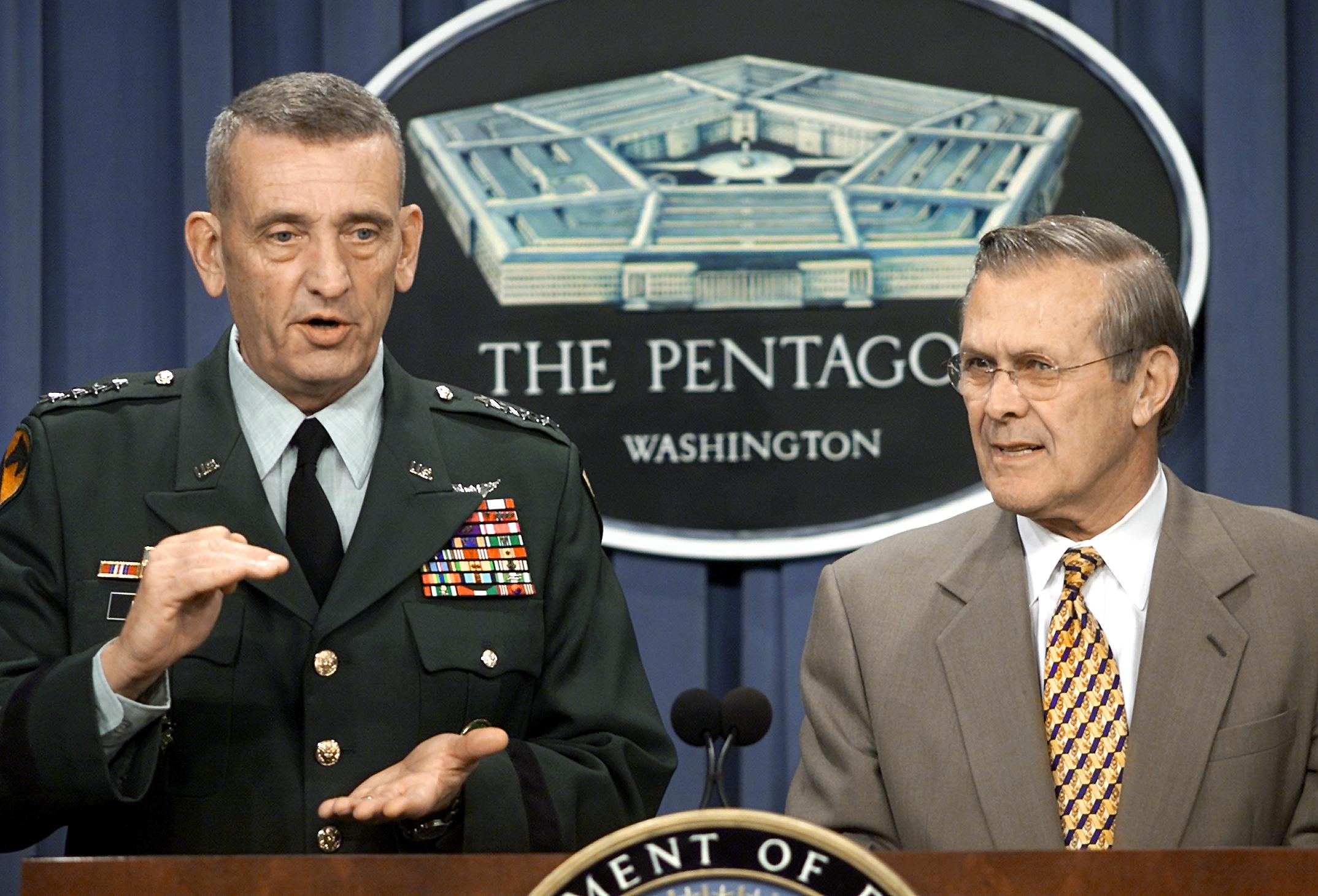
General Tommy Franks (L), commander of the U.S. military campaign in Afghanistan, and U.S. Secretary of Defense Donald Rumsfeld (R) hold a joint briefing on November 8, 2001, at the Pentagon. (Paul J. Richards/AFP via Getty Images)
The parade of blunders never seemed to stop.
Here’s a good one: One of the arguments made by critics of the war was that if we toppled Saddam Hussein, a Sunni Muslim, we would be empowering the Shia Muslims of Iraq, who were in league with their fellow Shia Muslims in Iran. In other words, if we got rid of the Sunnis in Baghdad, we would be putting the Shias in charge, and they would be loyal (or at least friendly) to their fellow Shias in Tehran. To be sure, all this sectarian stuff was complicated, but complexity is an argument for not charging into a place you don’t understand.
But Bush charged in. And in 2006, Bush’s experts picked Nouri al-Maliki, a long time exile, to be prime minister, a post he held for eight years. So, where had al-Maliki been living prior to the U.S. invasion? You guessed it: in Iran. In other words, al-Maliki was likely an Iranian asset, which helps explain the pro-Iranian tilt Iraq has taken since we “liberated” it.
As the Saudi Arabians, themselves Sunnis, have said many times, the Americans “handed Iraq to Iran on a silver platter.” So, in 2015, when Donald Trump declared, “We are led by very, very stupid people,” that resonated. How could it not?
This is what our “best and brightest” gave us. We would have been better off with less expertise and more common sense.
Oh, and one more thing about Bush and his way of identifying experts: Another Bush pick for the Medal of Freedom was Anthony Fauci.
The Uniparty Exposed
The Uniparty is a notional concept with an obvious truth: the elites of the two parties, Democratic and Republican, are often more similar than different. There’s plenty of evidence to bolster the Uniparty idea, but Exhibit A is the vote in favor of the Iraq War in October 2002.
Here’s a partial list of top Democrats who voted “yea” in the U.S. Senate: Joe Biden, John Kerry, Hillary Clinton, Chuck Schumer — and 25 more Democratic Senators.
And in the U.S. House, such top figures as Dick Gephardt, Steny Hoyer, John Murtha, and Henry Waxman—as well as 77 more Democratic Representatives — voted “yea.” And, of course, almost all the Republicans voted for the war. (Rand Paul and Tom Massie were not yet in Congress.)
So, the total number of pro-war votes in the Senate was 77; and in the House, 296. Behold the Uniparty’s mighty hand!
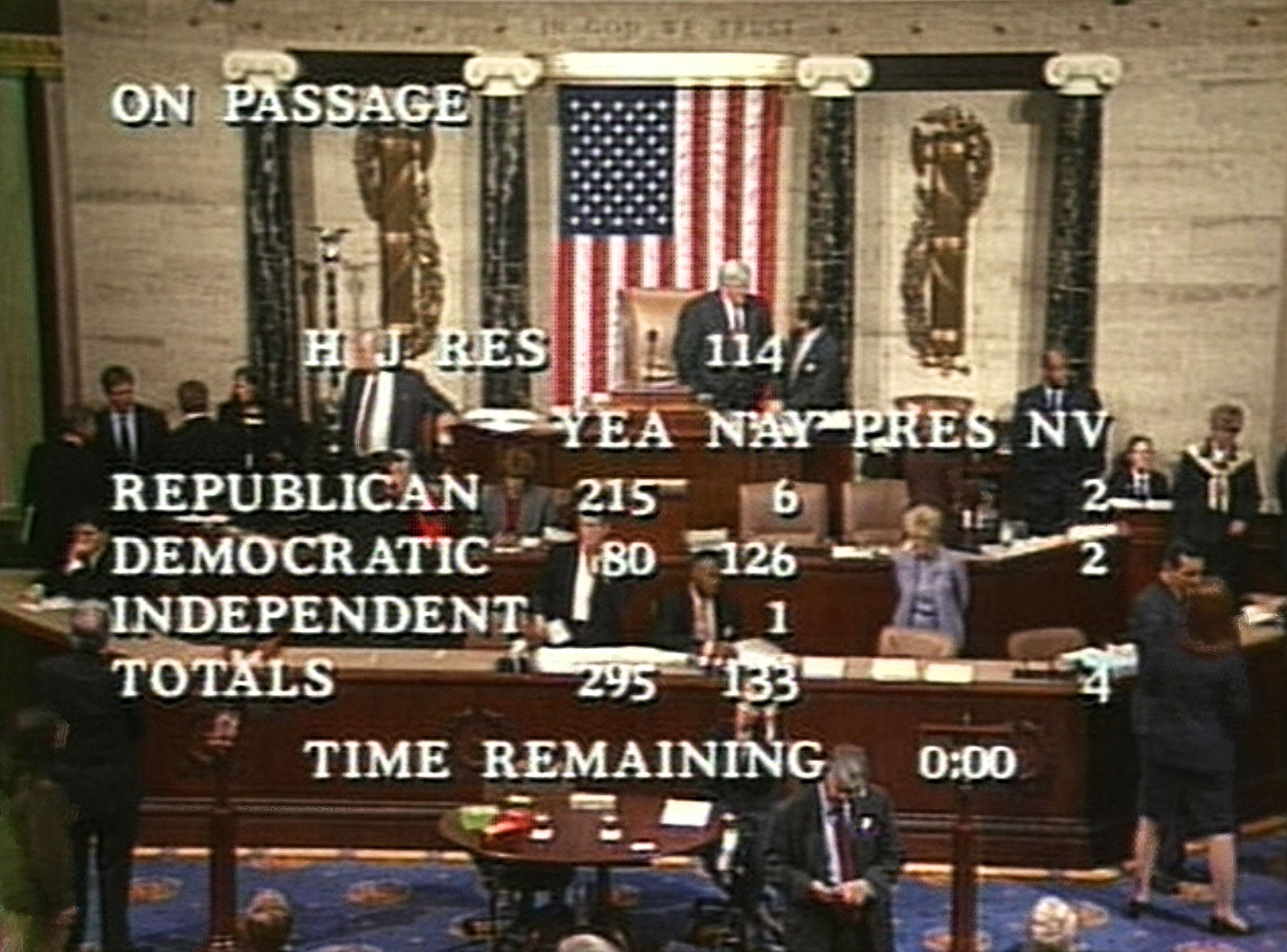
This television graphic shows the U.S. House vote on Joint Resolution 114 authorizing the Iraq War on October 10, 2002. (House TV/Getty Images)
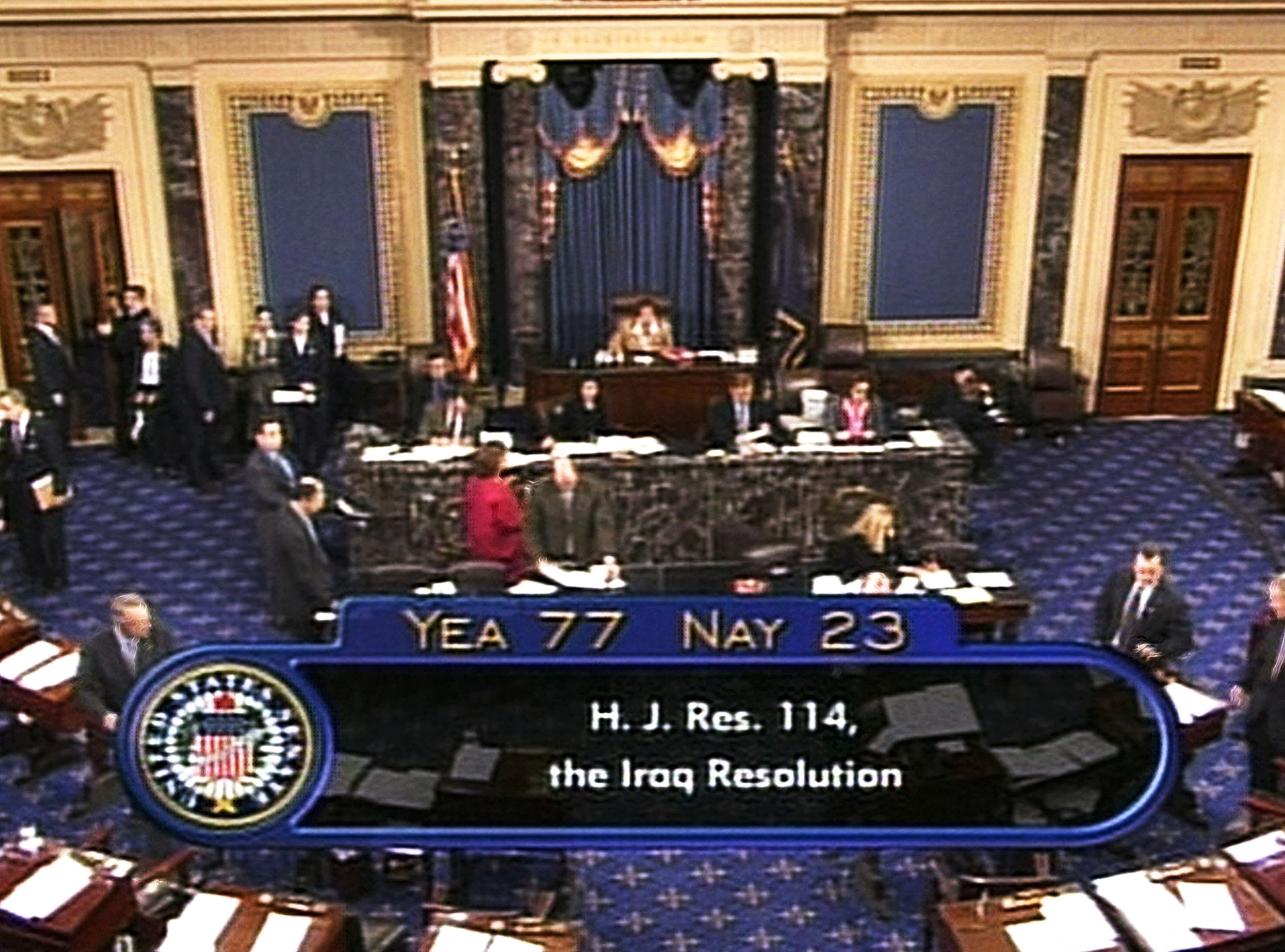
This television graphic shows the final U.S. Senate vote on Joint Resolution 114 authorizing the Iraq War on October 11, 2002. (Senate TV/Getty Images)
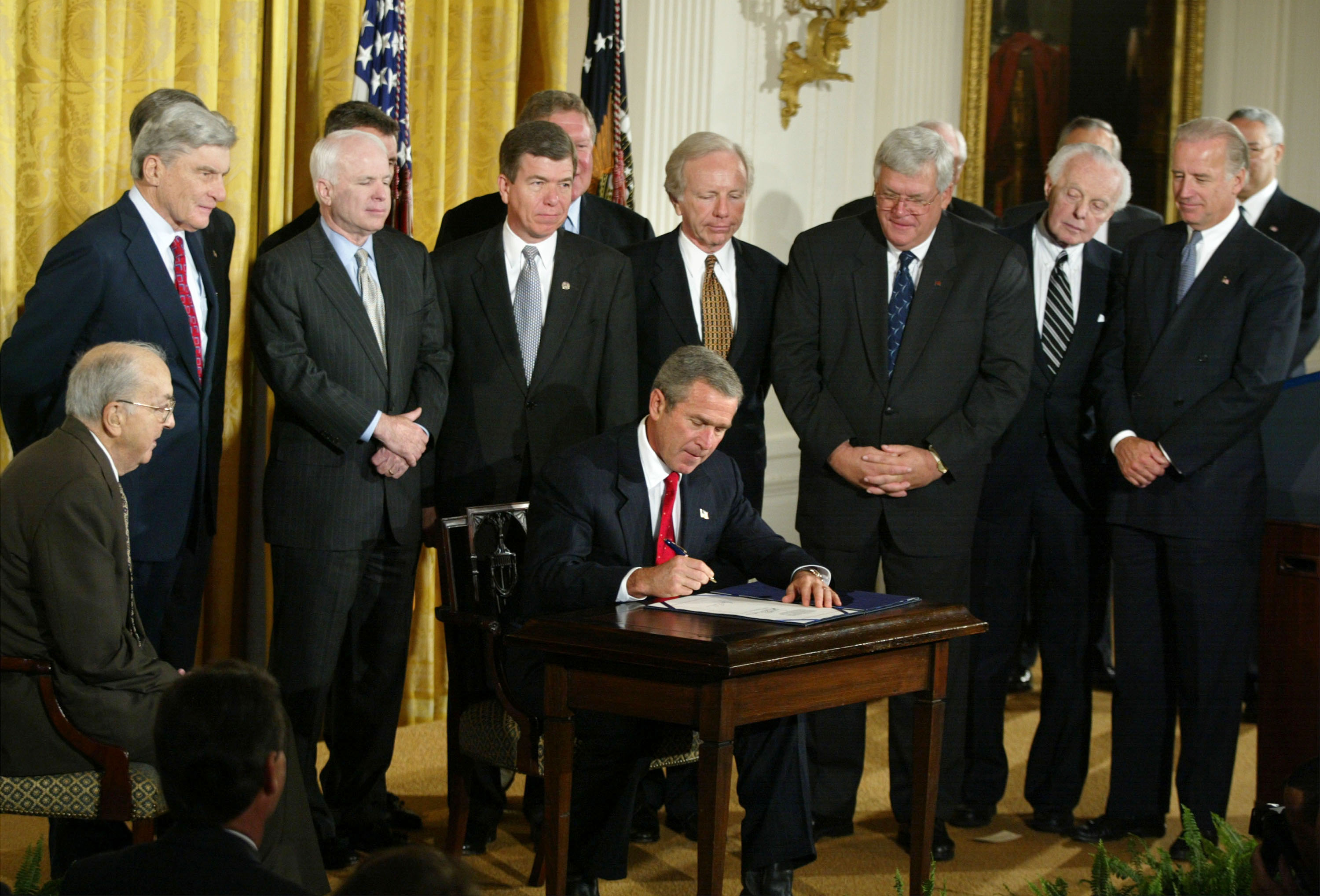
President George W. Bush signs Resolution 114, authorizing the use of force against Iraq, surrounded by a bipartisan audience (including then-Senator Joe Biden of Delaware on the far right) on October 16, 2002, at the White House. (Mark Wilson/Getty Images)
The Rise of Trump
The voters punished the Bush Republican Party in the 2006 and 2008 elections. Democrats won the White House and both chambers of Congress by wide margins.
Yet as we have seen, the GOP establishment still assumed that grassroots Republicans were in the thrall of the Bushes. And so, top Republicans simply could not believe that Donald Trump was going to get anywhere in 2016, especially after he made clear his disdain, even contempt, for the Bush family.
Case in point: the 2016 Republican debate before the all-important South Carolina primary.
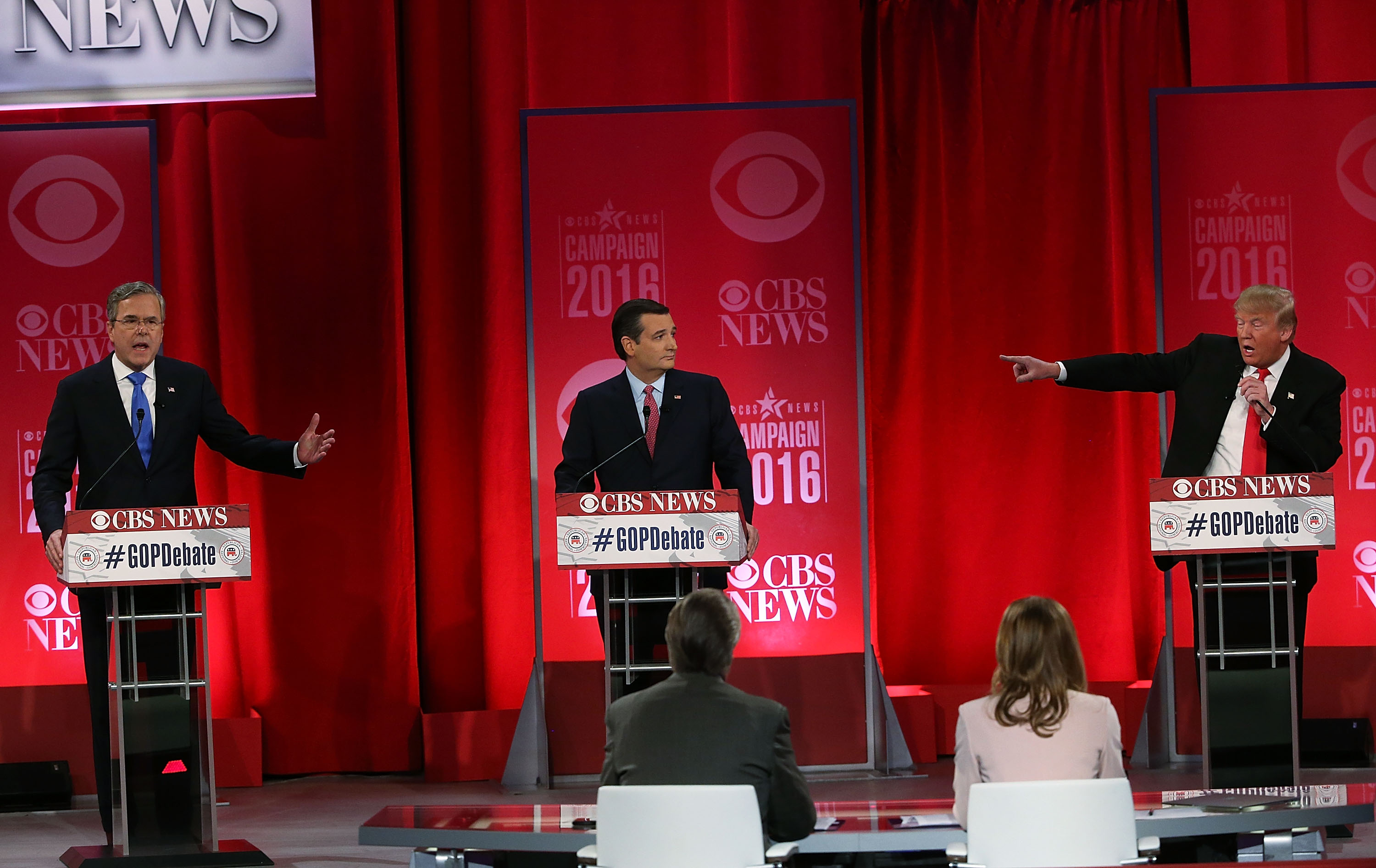
Republican presidential candidates Jeb Bush (left) and Donald Trump (right) spar during the GOP debate in Greenville, SC, on February 13, 2016, a week before the South Carolina primary. (Spencer Platt/Getty Images)
At the Republican presidential debate in Greenville, SC, the moderator probably thought he was doing Jeb Bush a favor when he recalled that back in 2008, Trump had been asked about the possibility of impeaching George W. Bush.
Trump answered, “Personally, I think [it] would have been a wonderful thing.” That 2008 question to Trump had been a hypothetical about something that was not going to happen, and yet even so, Trump’s willingness to challenge the Bush Dynasty was electric to the audience — some hated it, and yet some loved it.
At that same 2016 debate, an angry Jeb Bush said of Trump, “I am sick and tired of him going after my family . . . My brother was building a security apparatus to keep us safe, and I’m proud of what he did.” To which Trump responded, “The World Trade Center came down during your brother’s reign, remember that.”
Once again, the electricity, positive and negative, jolted the audience. But Trump wasn’t done.
Assessing Bush and the experts, the upstart candidate said to the audience: “I want to tell you: They lied. They said there were weapons of mass destruction, there were none, and they knew there were none.” He added of Bush specifically, “He lied; he got us into the war with lies.”
[embedded content]
After the debate, Politico summed up the instant conventional wisdom. Having heard from Republican “activists, operatives and early-state strategists,” the site pronounced its headline: “Insiders: Trump flopped in debate.” One of those instapundits declared, “Trump’s attack on President George W. Bush was galactic-level stupid in South Carolina.”
A week later, Trump won South Carolina and went on, of course, to win the Republican nomination and the presidency.

Donald Trump celebrates winning the South Carolina primary in Spartanburg, South Carolina, on February 20, 2016. (JIM WATSON/AFP via Getty Images)
Looking back, it seems fair to say that the key to Trump’s appeal was his willingness, even eagerness, to challenge Republican icons and their orthodoxy. There was kind of a thrill in seeing a man who was bold enough to call the Iraq War what it was: a tragic mistake (although, of course, Trump was often punchier).
So, yes, there were plenty of warhawks in South Carolina, and plenty of them went to fight — and yet plenty of them came home disillusioned, ready to listen to a critic such as Trump. (An academic study from 2014 closely linked casualties in the Iraq War to changing views on the war, which should not be a surprise.)
America Comes First
The name America First dates back to the era just before U.S. entry into World War II, when millions of Americans in both parties were eager to avoid another war in Europe. However, after the Japanese bombed Pearl Harbor in December 1941, America First evaporated.
So, Trump’s revival of the phrase was yet another surprise. Yet today, with Trump out of office, the phrase still lives. America First has been normalized, such that it’s now a common way of thinking: America Comes First, or at least it should. Now ordinary people, good citizens, think to themselves: Why am I footing the bill for X? Or, Why am I getting short-shrifted compared to Y? Or, Why is my money going to Z?
That spirit of questioning the establishment is a legacy of Trump. And, as we have seen, Trump’s rise is due in no small part to the backlash against Iraq.
Hearteningly, just on March 16, the Senate voted 68:27 to repeal the 2002 Authorization for the Use of Military Force (AUMF), the pro-war bill that all those Democrats and Republicans voted for two decades ago, which has allowed the “UniWarParty” to do as it pleases in the Middle East and around the world. Two years ago, the House voted, as well, to repeal the AUMF, but that was in a different Congress. So, in this Congress, the House will have to vote again. It would be nice to think that the House repeating its repeal will be a “slam-dunk,” but as we have learned the hard way, there’s no such thing.
Still, whatever Congress does on the AUMF, the American people have changed. They no longer wish to authorize force on the advice and “intelligence” of experts.
Indeed, it’s through this new America Comes First prism that we can evaluate all the questions that affect ordinary Americas, from trade and foreign aid, to immigration and border security, to bank bailouts and aid to Ukraine. This is the prism that Fox News’ Tucker Carlson looks through every night on his show.
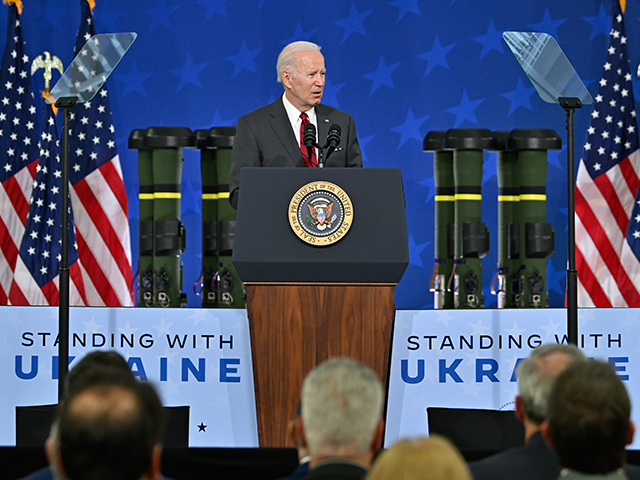
President Joe Biden delivers a speech at the Lockheed Martin facility that manufactures the Javelin anti-tank missiles that Biden is giving Ukraine on May 3, 2022, in Troy, Alabama. (Peter Zay/Anadolu Agency via Getty Images)
In the meantime, it’s no accident (and it’s a sharp change from the Obama and Bush administrations) that the Biden administration uses the phrase “middle class” in practically every sentence. One can question Biden’s sincerity, but one can’t question his certainty—he really, really, wants to be known as Middle Class Joe.
Unfortunately for Biden, the new mantra of America Comes First collided with reality when all those tank cars of vinyl chloride derailed in East Palestine, Ohio. In the wake of that disaster, the Biden administration — including its former golden boy, Transportation Secretary Pete Buttigieg — looked both tin-eared and flat-footed.
Then Trump aced them further when he traveled to East Palestine.

Former President Donald Trump gives remarks at the East Palestine Fire Department station in East Palestine, Ohio, on February 22, 2023, following the train derailment there. (Michael Swensen/Getty Images)
Defenders of the Biden approach can say that there are some 1,000 train derailments a year, and they have a point there, even if East Palestine was worse than almost all of them.
But what really matters is that East Palestine, Ohio — and all the East Palestines, so to speak, in the other 49 states — have had their eyes opened. They have seen how Big Business and Big Government have treated them. The light-switch has gone on. And now the reflexes are quick.
For instance, on March 15, when the Biden administration announced $331 million in foreign aid to Ethiopia, Newsmax host Rob Schmitt tweeted a shot of a question: “Is this near East Palestine, OH?” And no word yet on how folks in East Palestine feel about the possible restoration of a free trade deal with Ethiopia.
Is this near East Palestine, OH? https://t.co/nRFf55ZNwS
— Rob Schmitt (@SchmittNYC) March 15, 2023
Probably nobody has spoken better for East Palestine than Ohio’s freshman Senator J.D. Vance. In words to the Senate Environment and Public Works Committee, Vance criticized the careless attitude of the “bicoastal elite” and, remarkably for a Republican, criticized the Staggers Act, a rail deregulation bill reaching back to 1980. (Yes, Republicans really are rethinking some things.)
We can close by noting that Vance’s rapid political rise — he’s only 38 — is yet another result of the Iraq War. After graduating high school, he enlisted in the Marine Corps and served in Iraq. Returning home, he published Hillbilly Elegy, and the rest is familiar history.
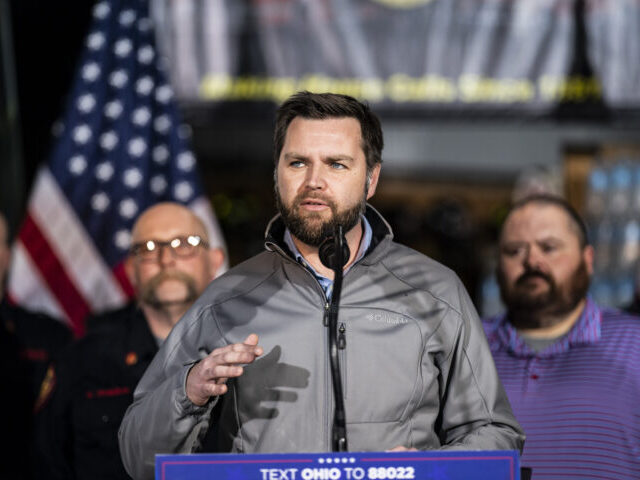
Sen. J.D. Vance (R-OH) speaks at East Palestine Fire Department during a visit to East Palestine, Ohio, on Feb. 22, 2023, following train derailment. (Jabin Botsford/The Washington Post via Getty Images)
But speaking of history, and for the folks of East Palestine — and all the other forgotten men and women across this land — Vance was as poetic and historical as one might expect:
These are Americans, they are our people, and their part in the warp and weft of our history should not end with this disaster. The strength of the thread is the strength of the fabric. It’s something we’ve forgotten and remembered, again and again, through the American System, the New Deal, and the Civil Rights Movement. Let’s take this opportunity over the coming months to remember again, and show that this chamber can act together for the nation’s benefit. The Senate should pass the Railway Safety Act, and the Senate should pass relief for East Palestine.
That speech, like the career of Sen. Vance himself, probably would not have happened were it not for the Iraq War.
So, yes, the Iraq War is to be regretted, and its architects should always be remembered for their folly. And yet, America, this wonderful country of ours, has a way of learning from its mistakes, while honoring service and sacrifice, and then figuring out how to do better.
And that, on this sad anniversary, is a heartening thought.






